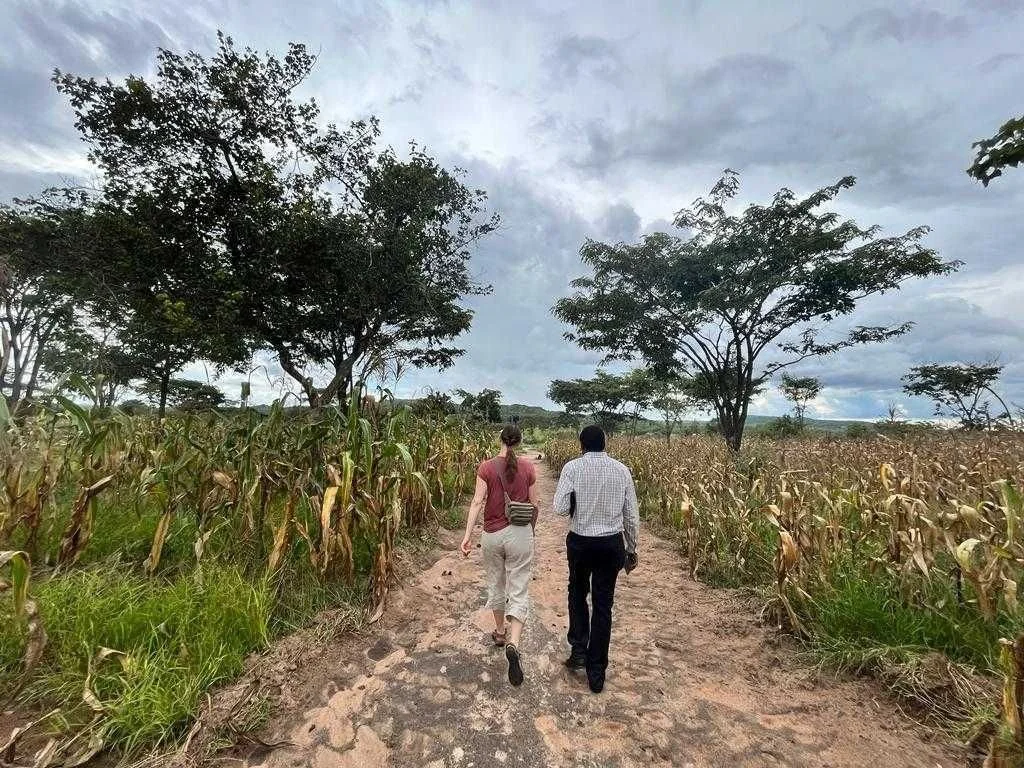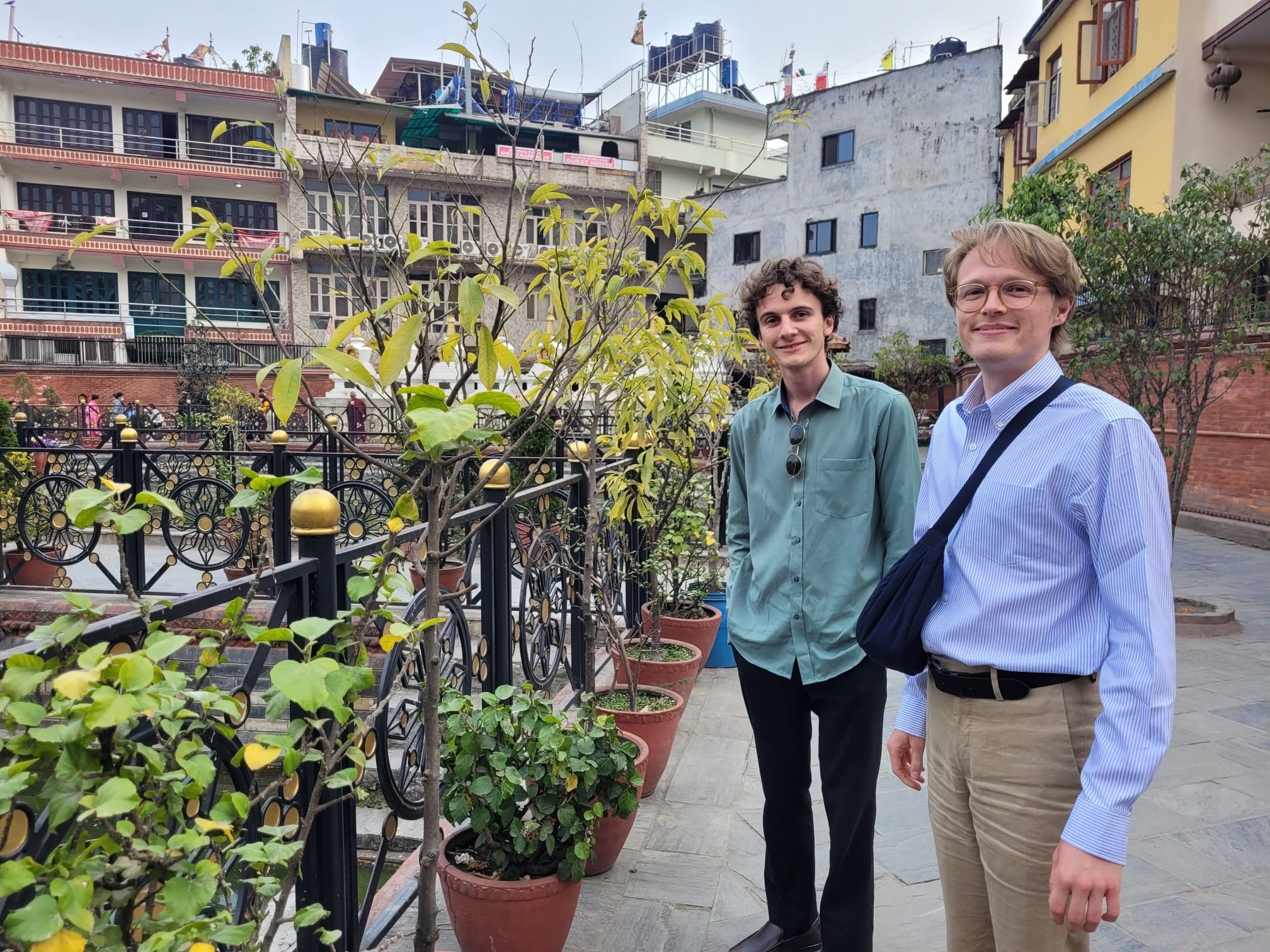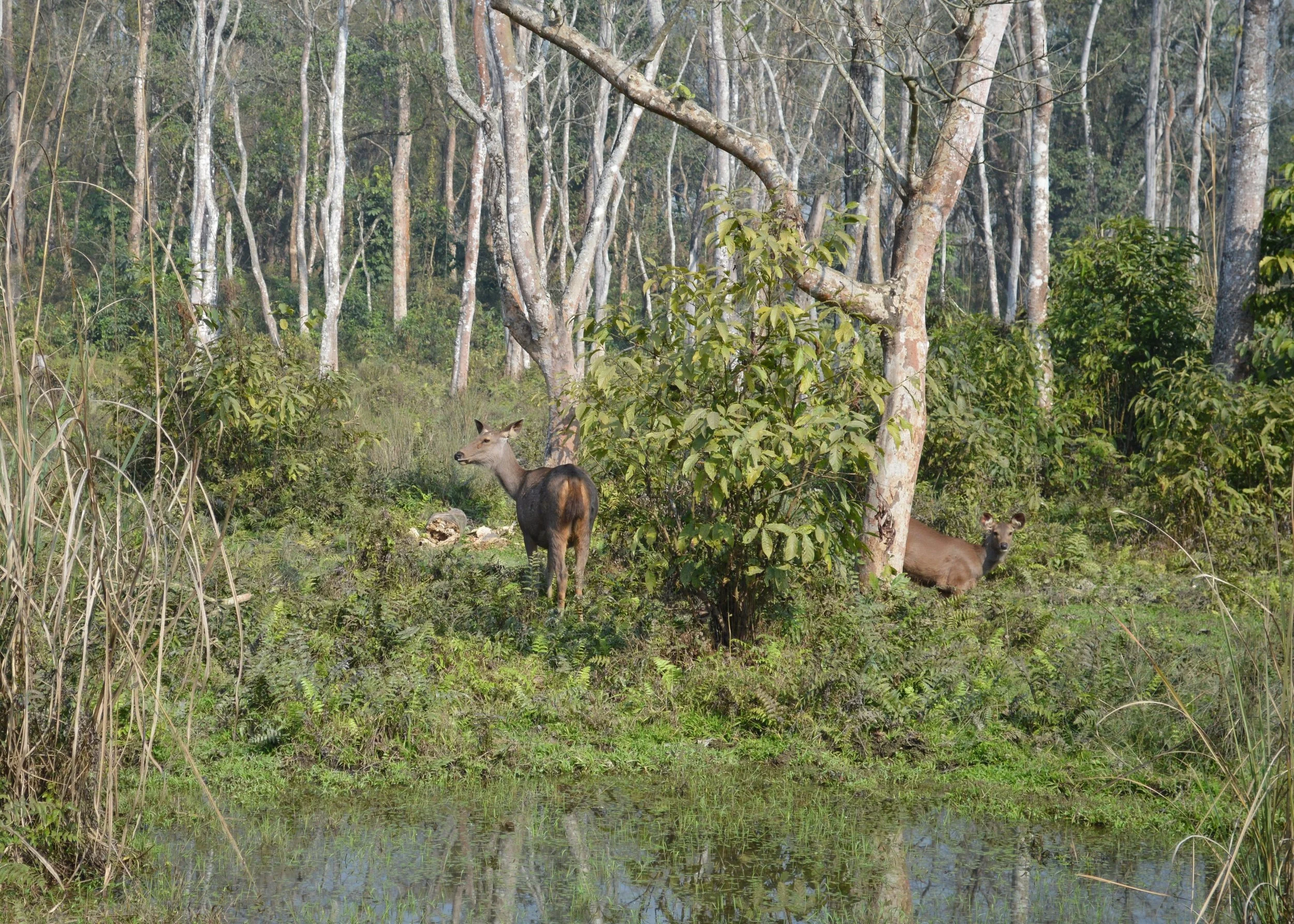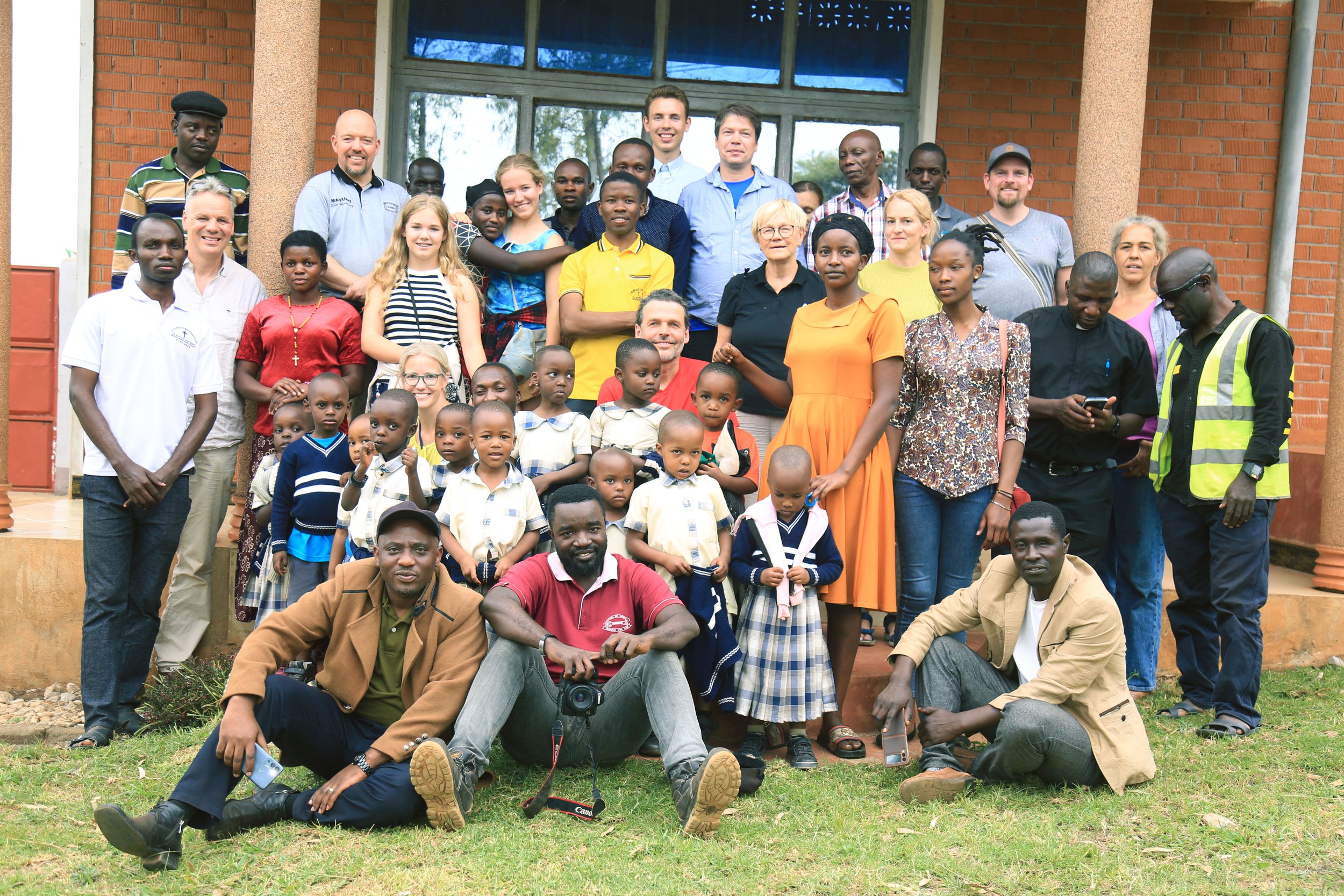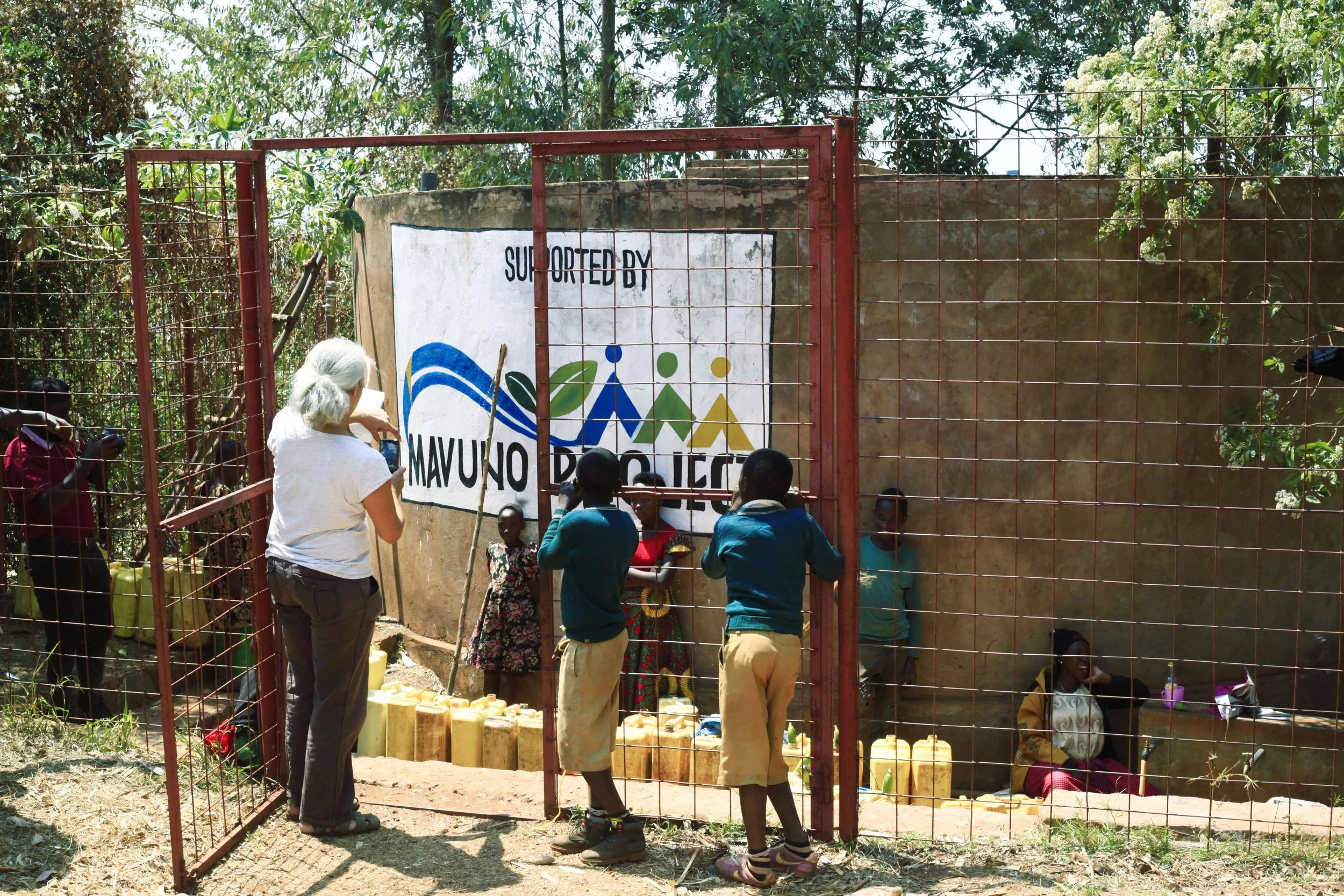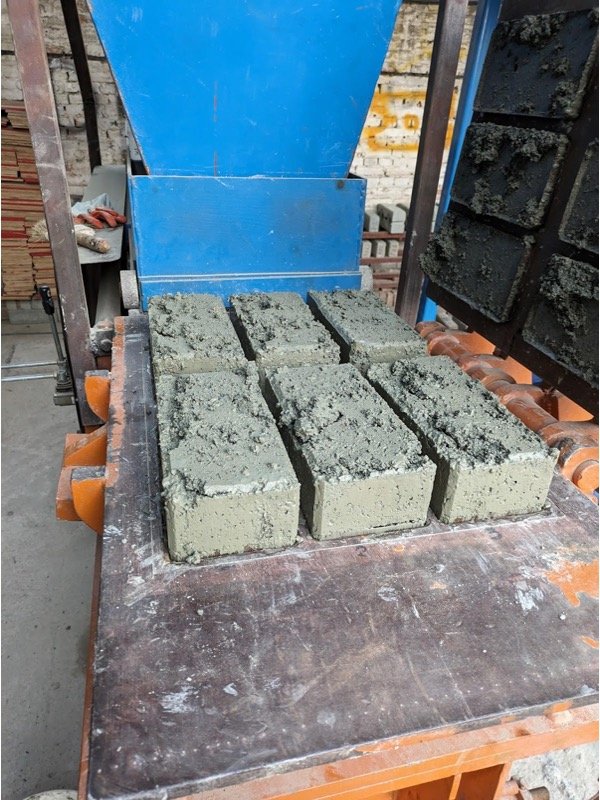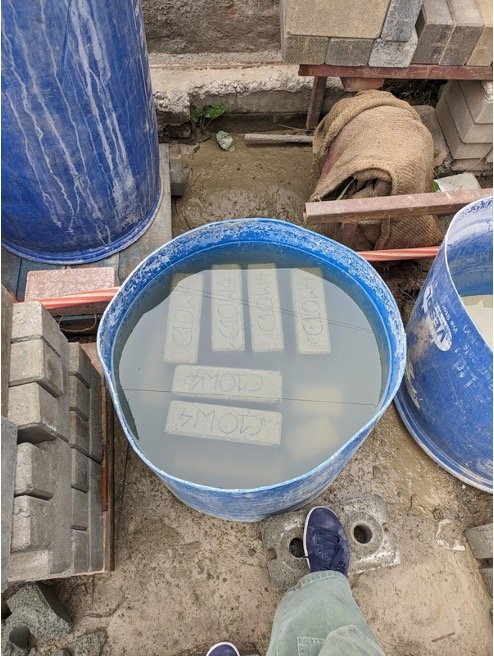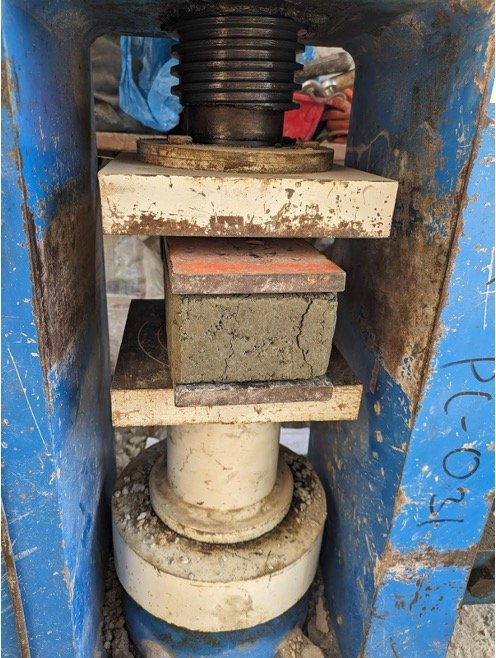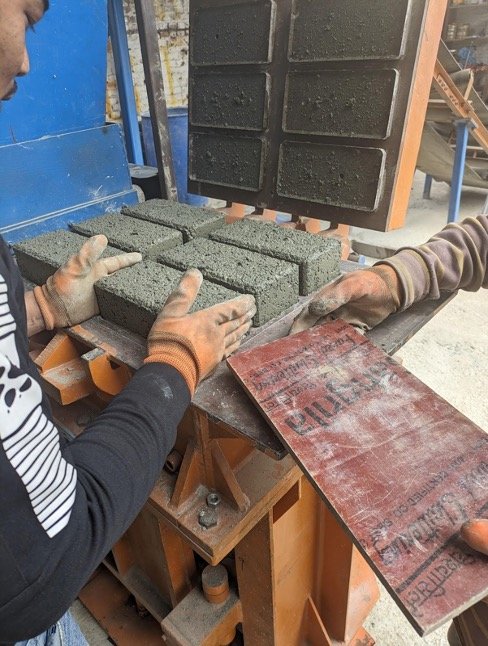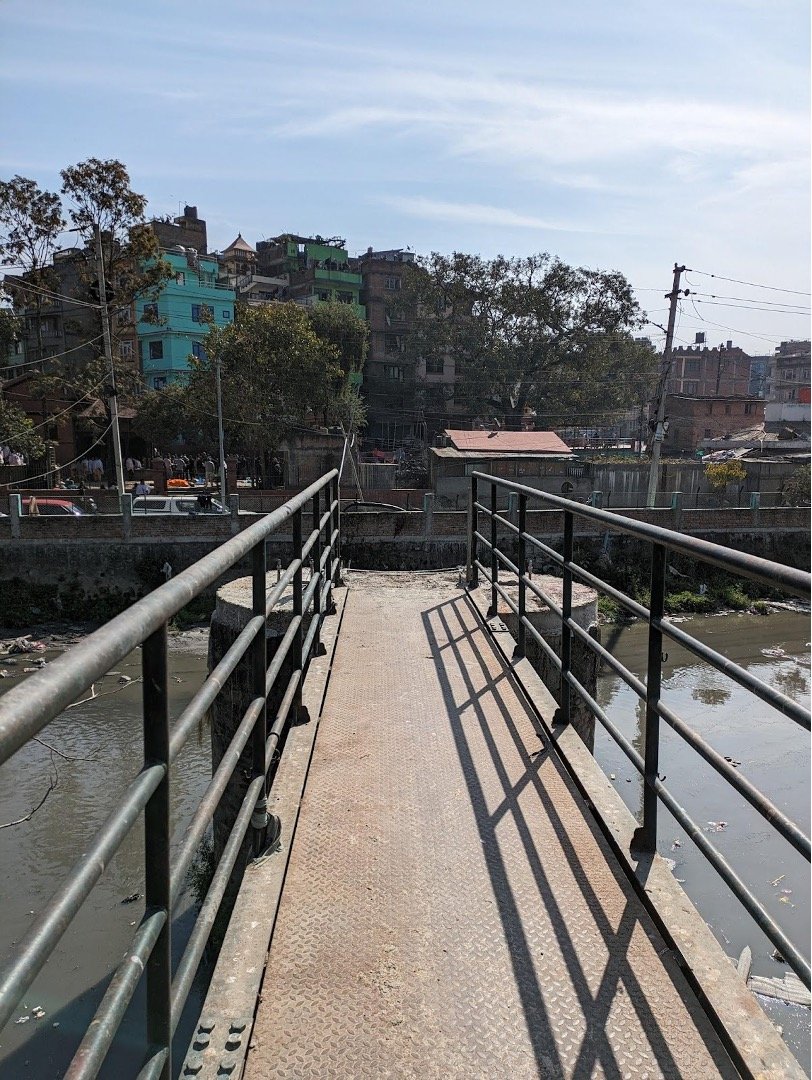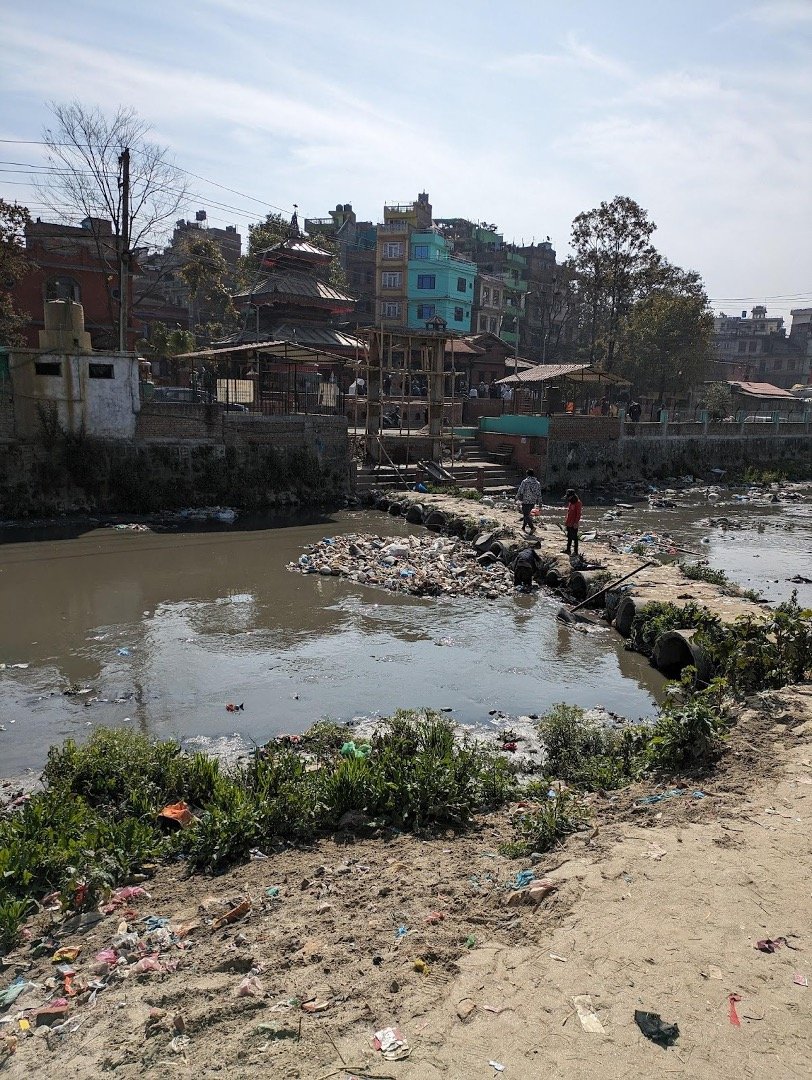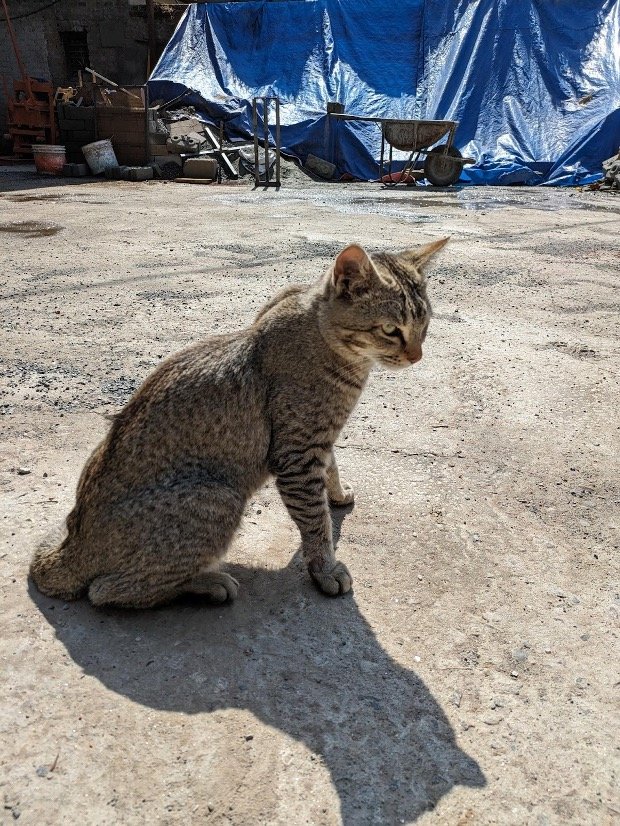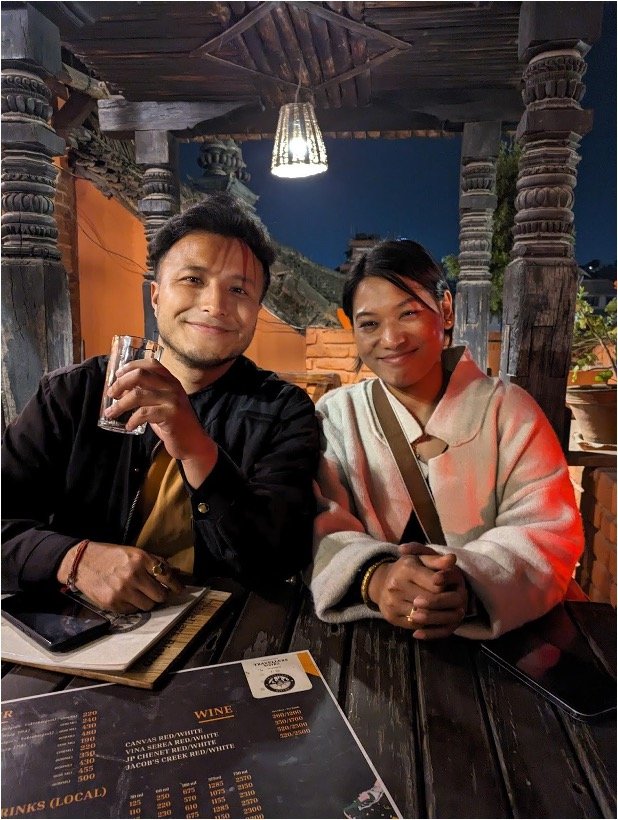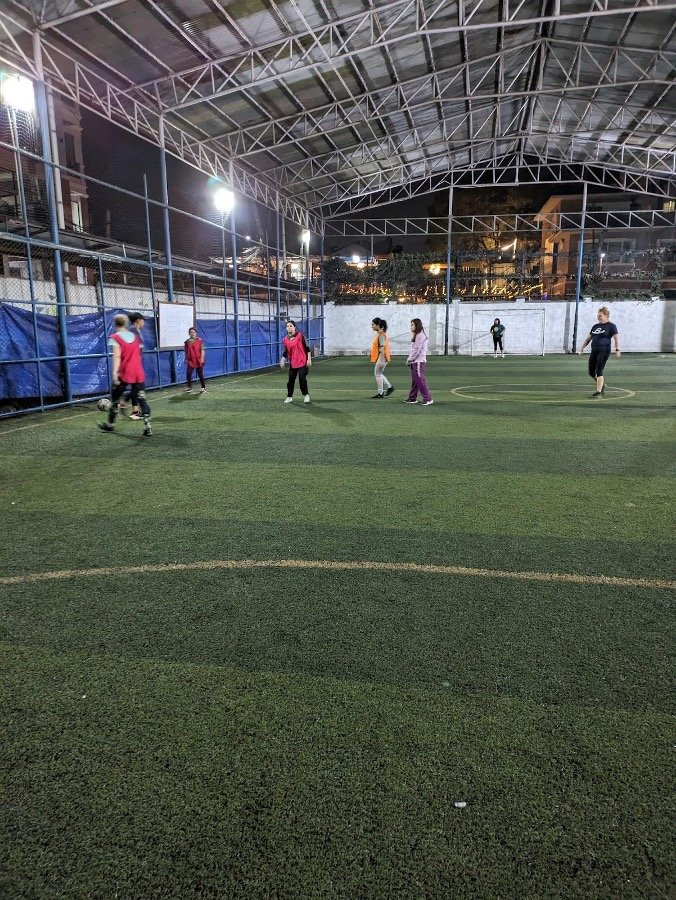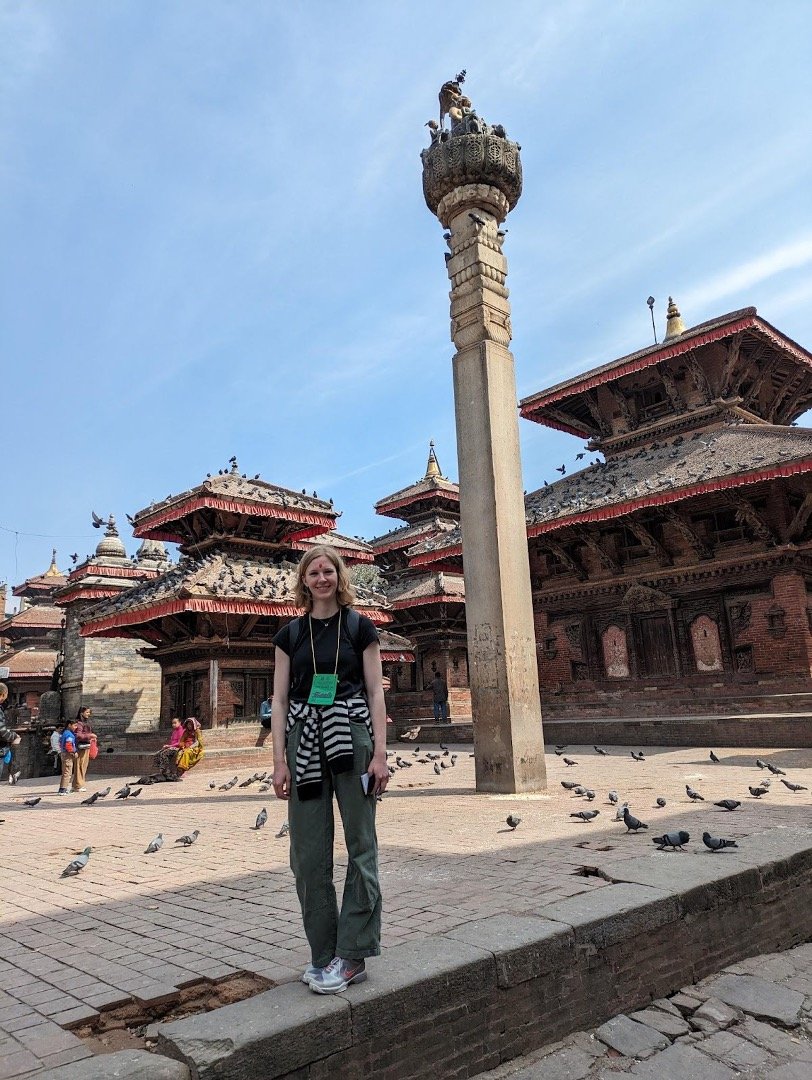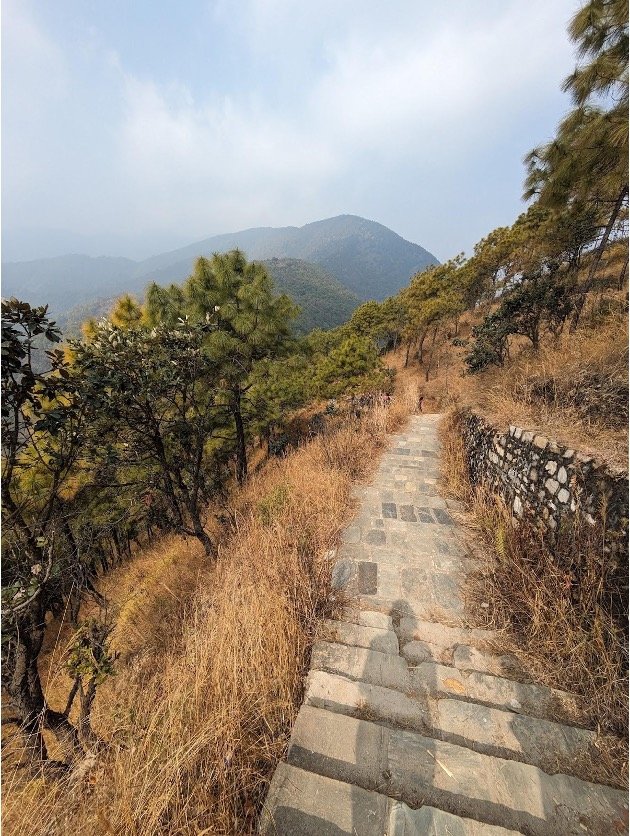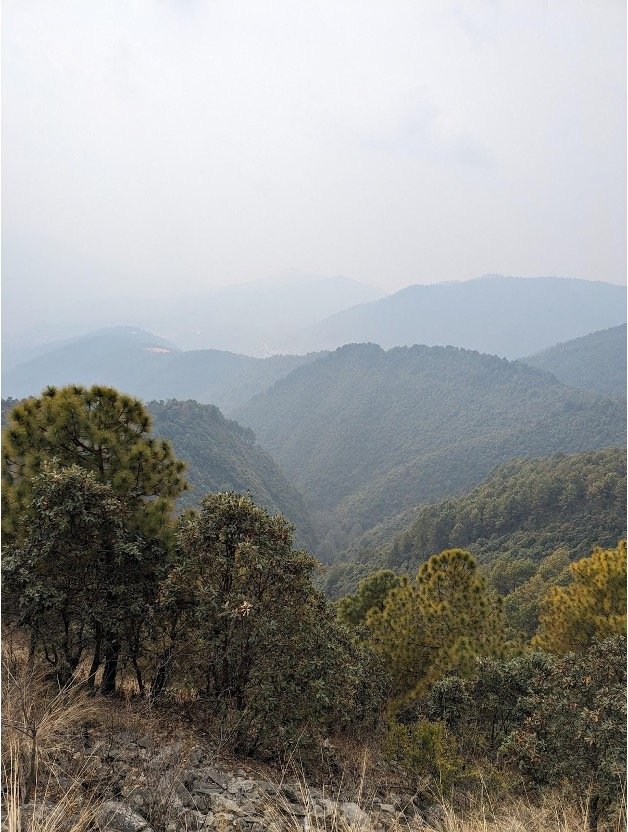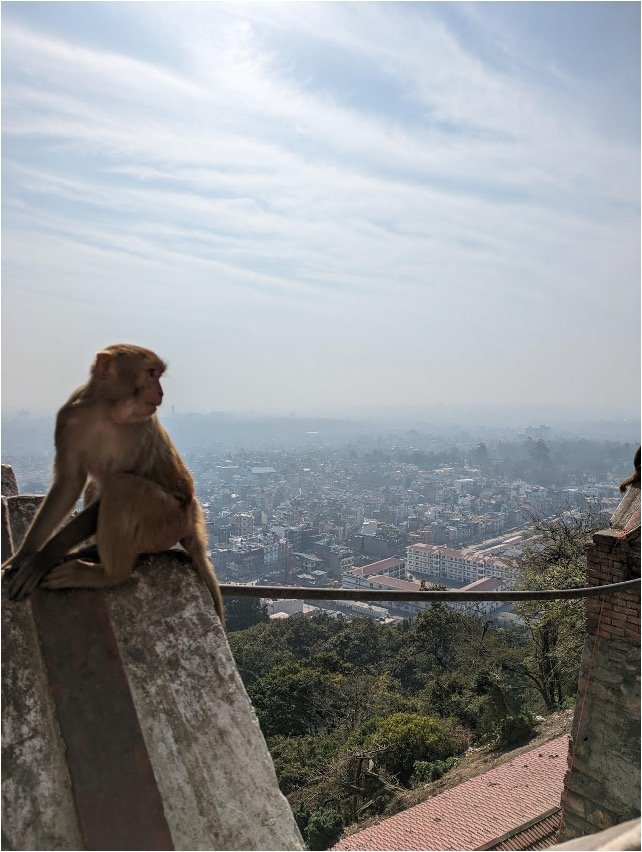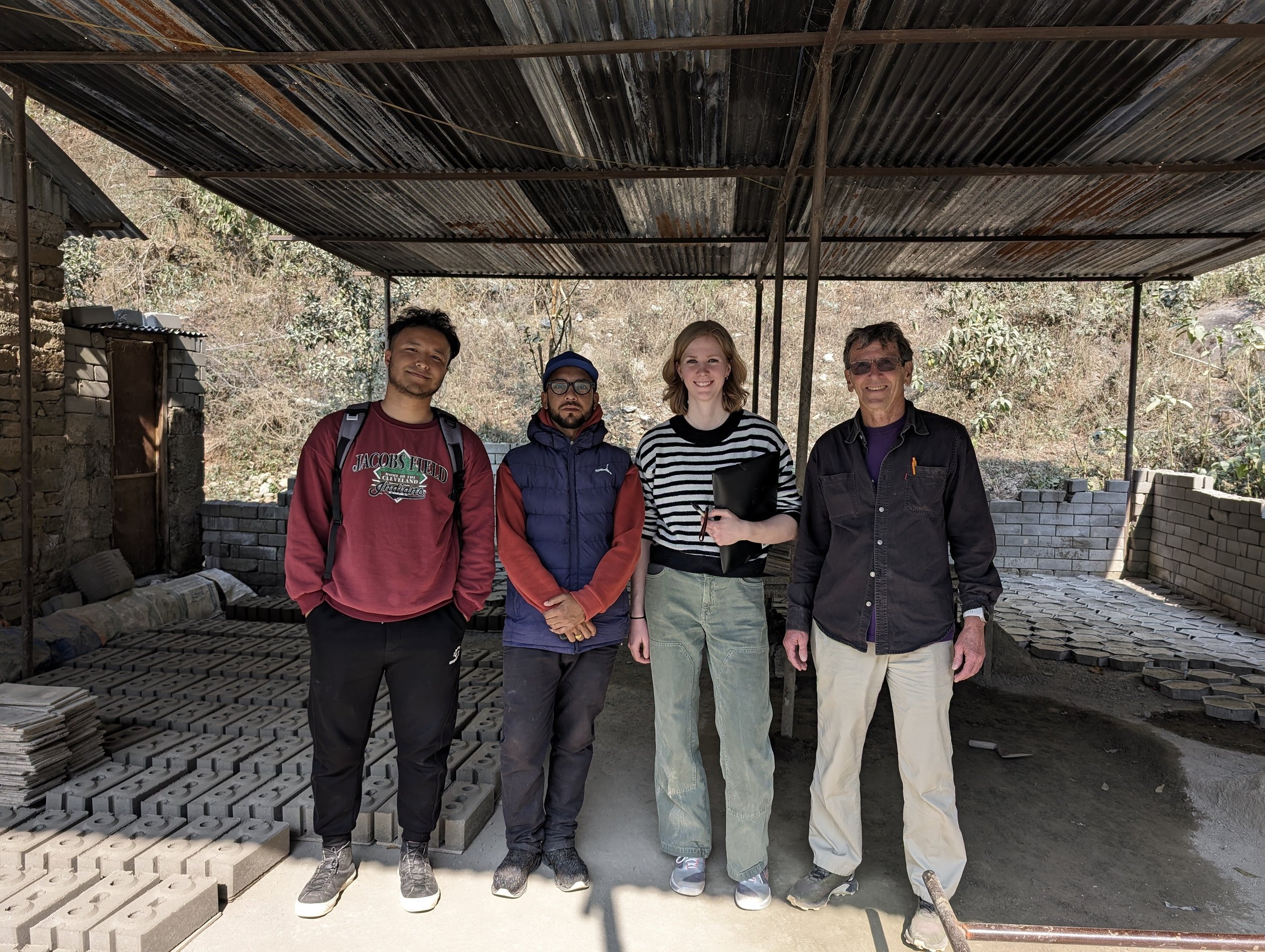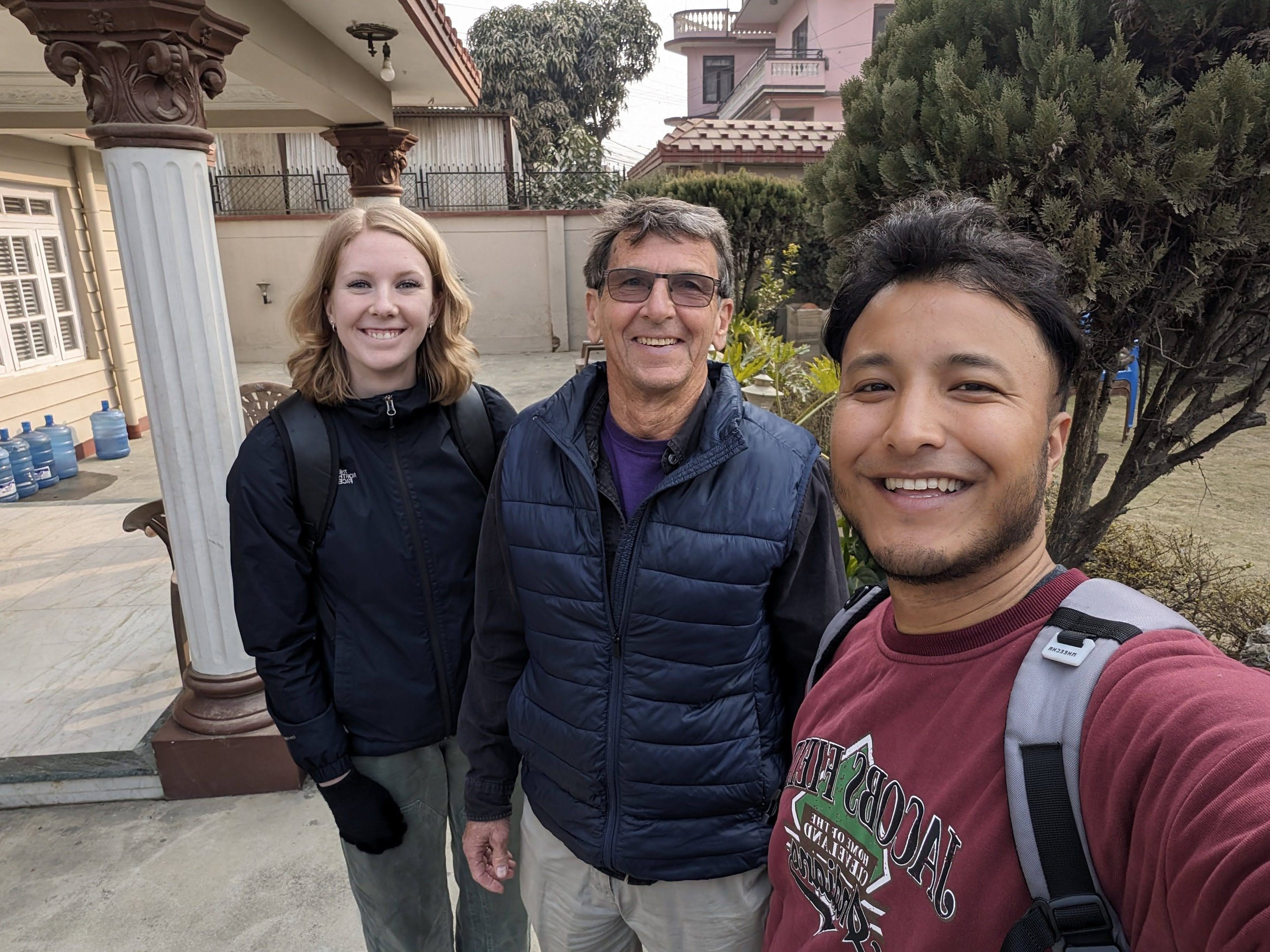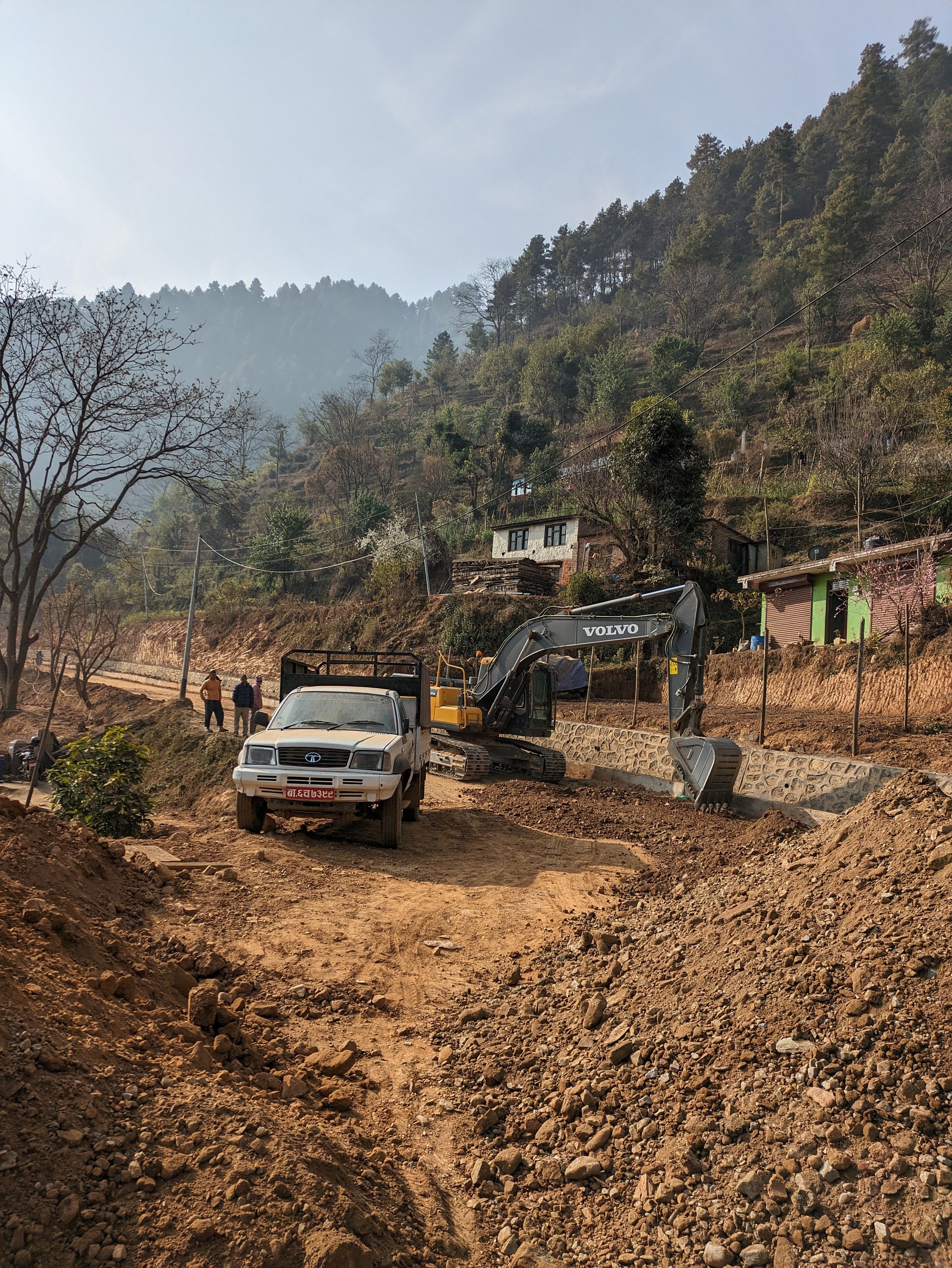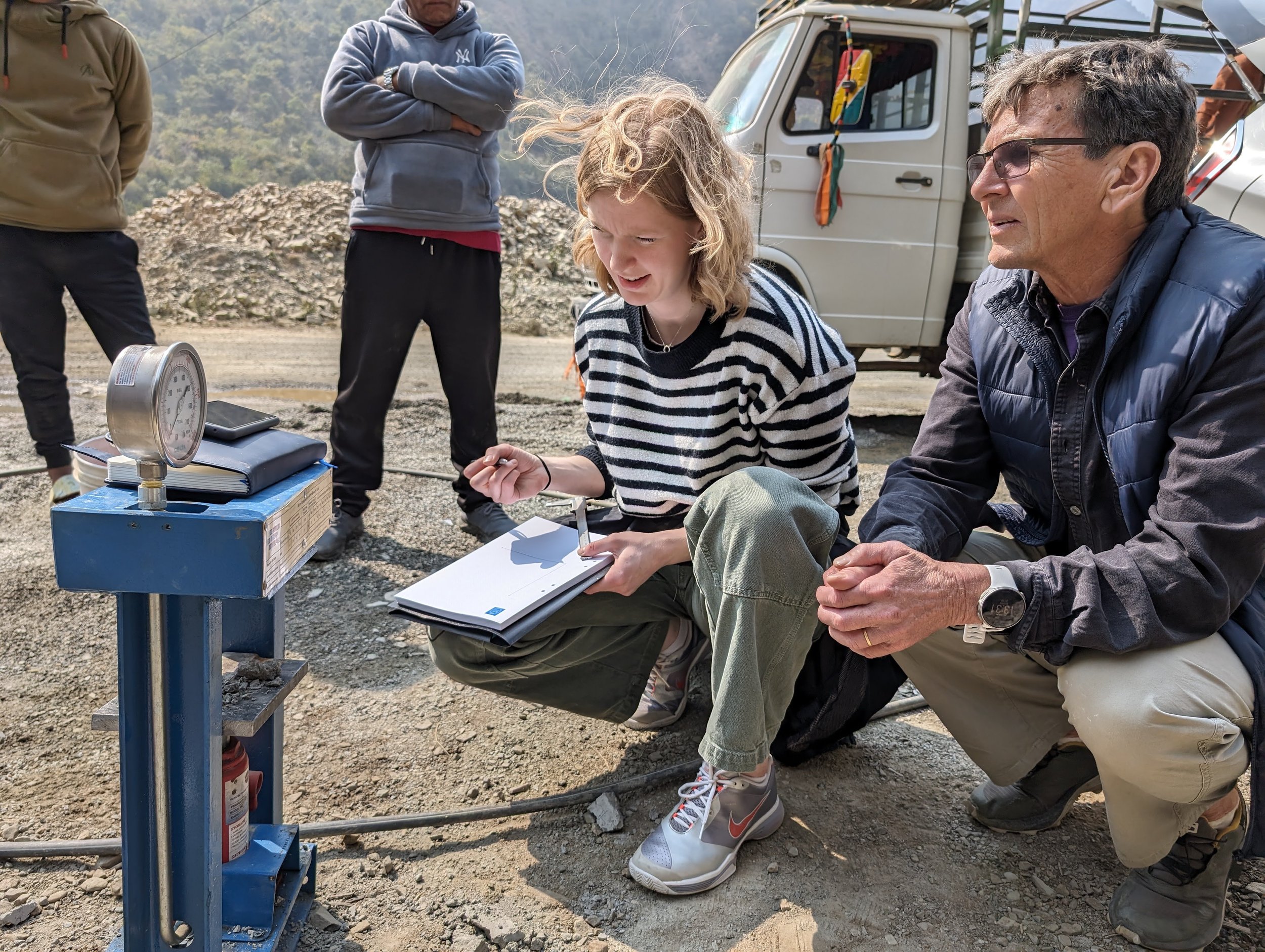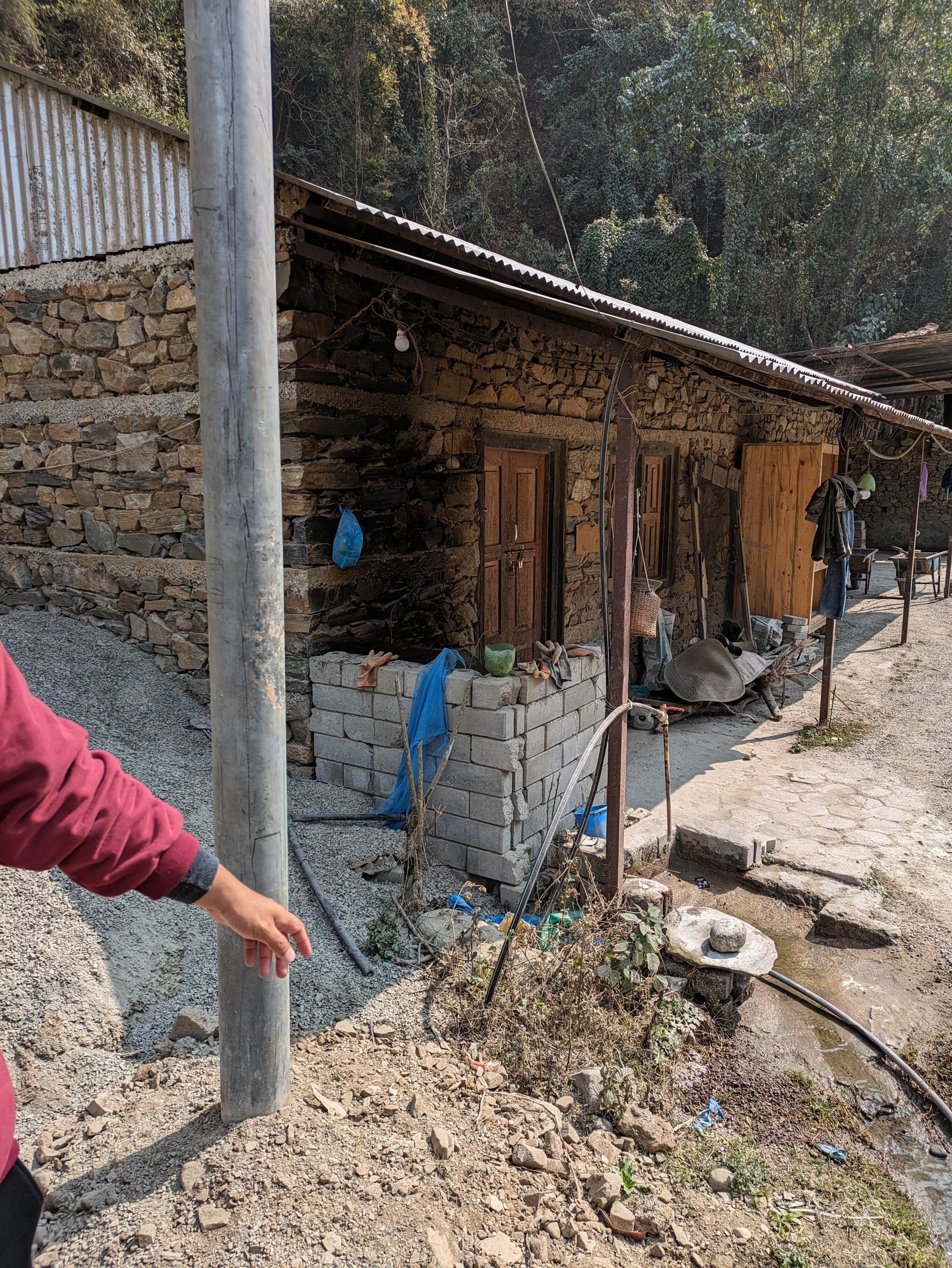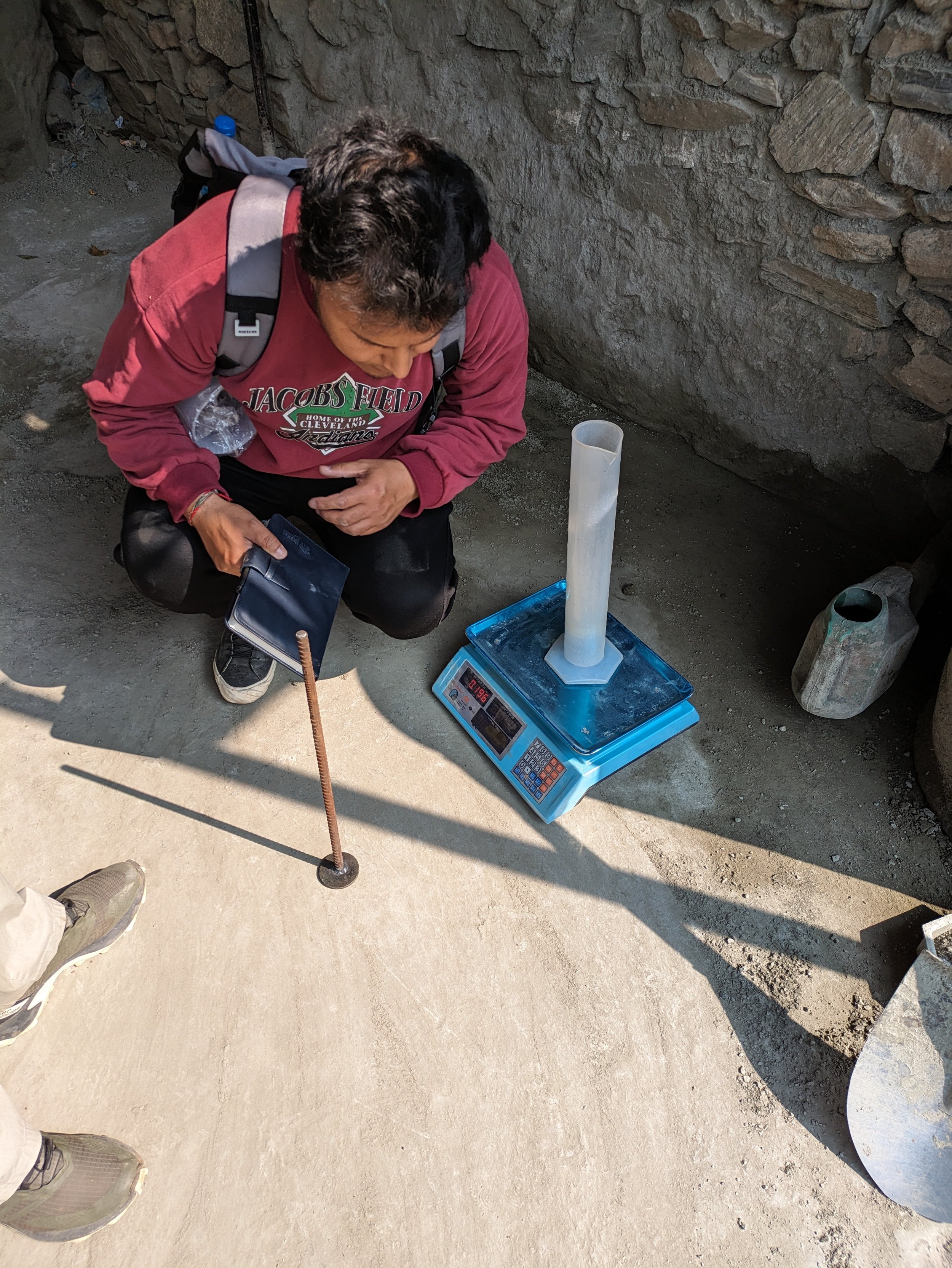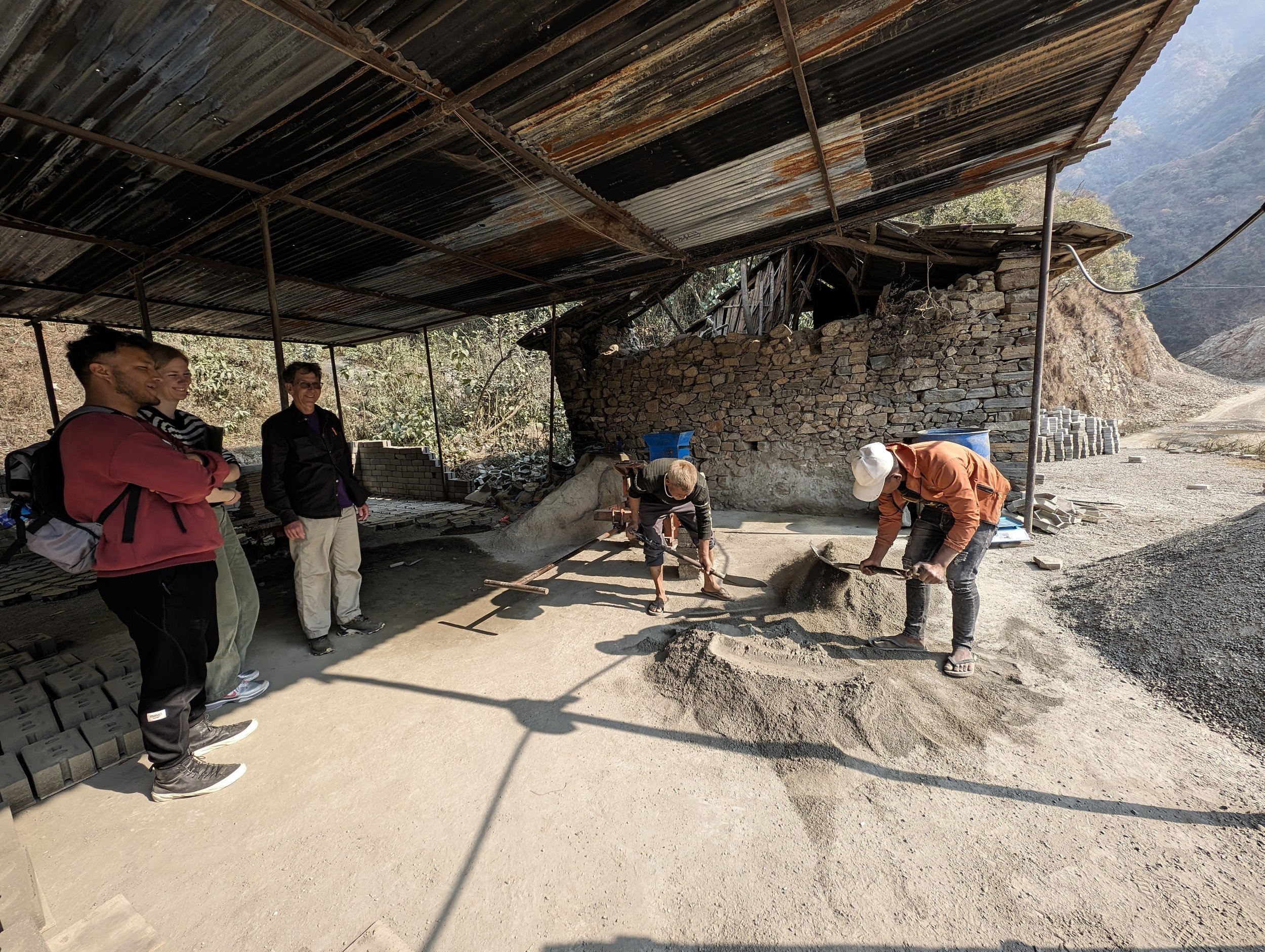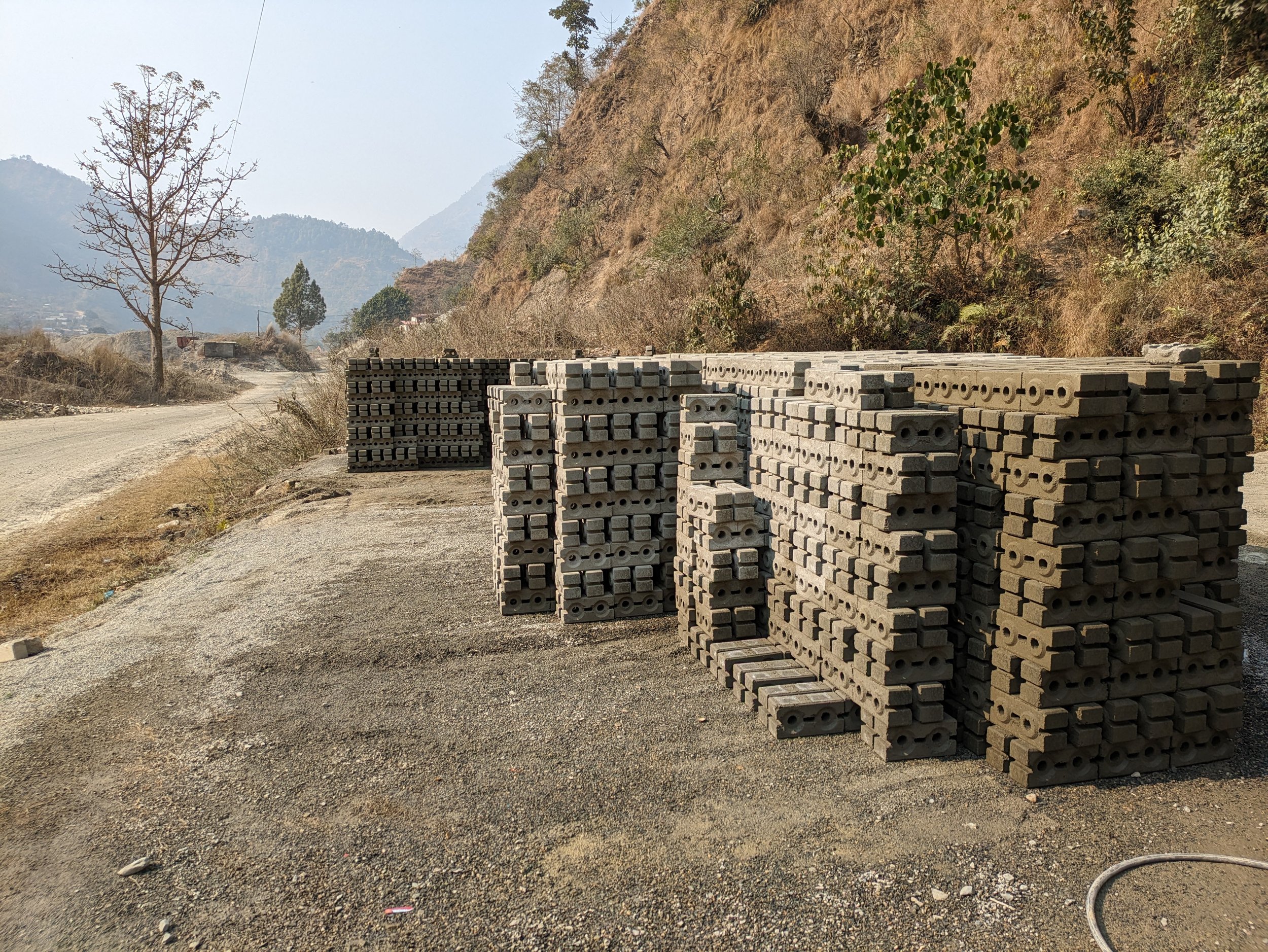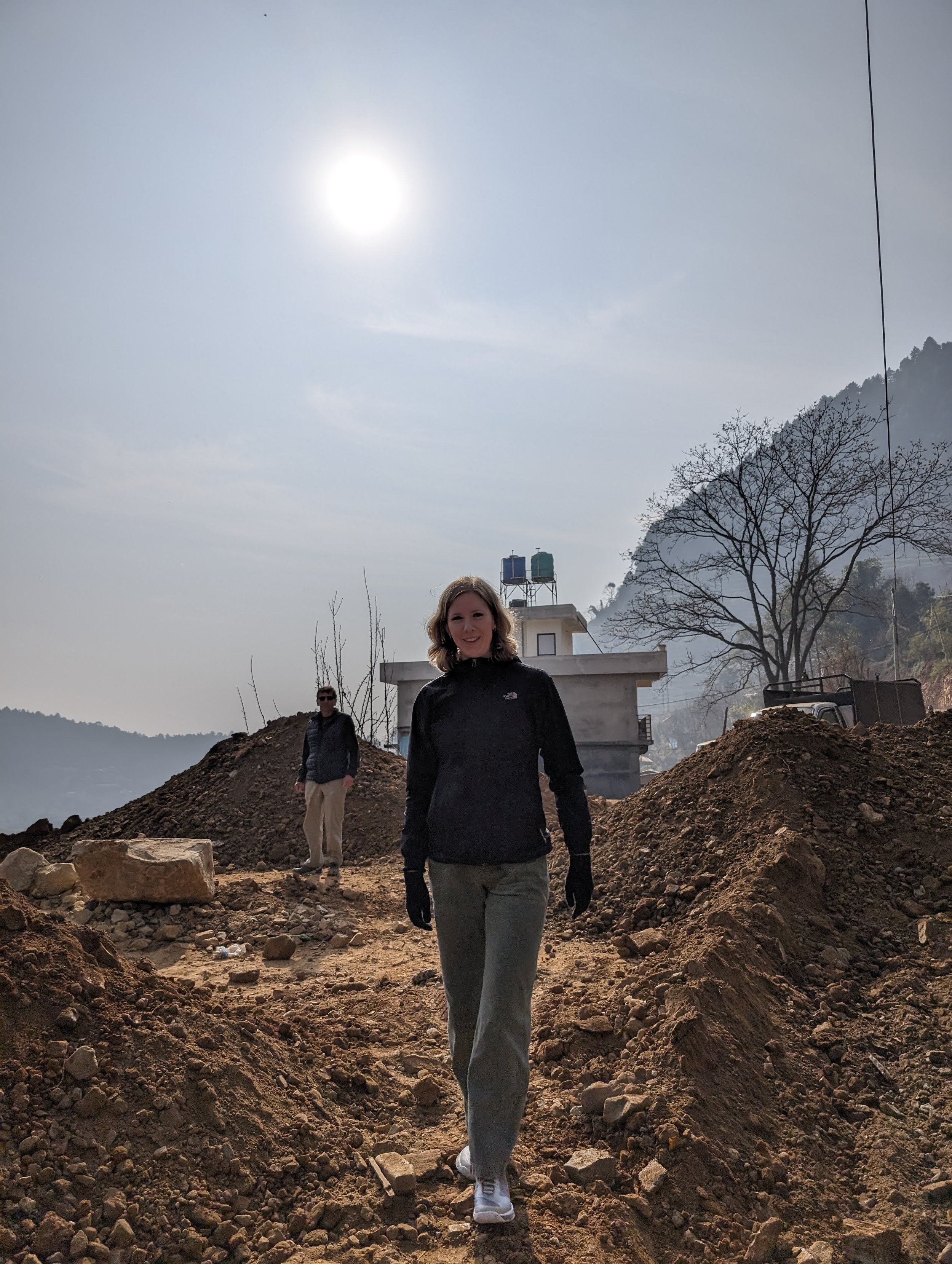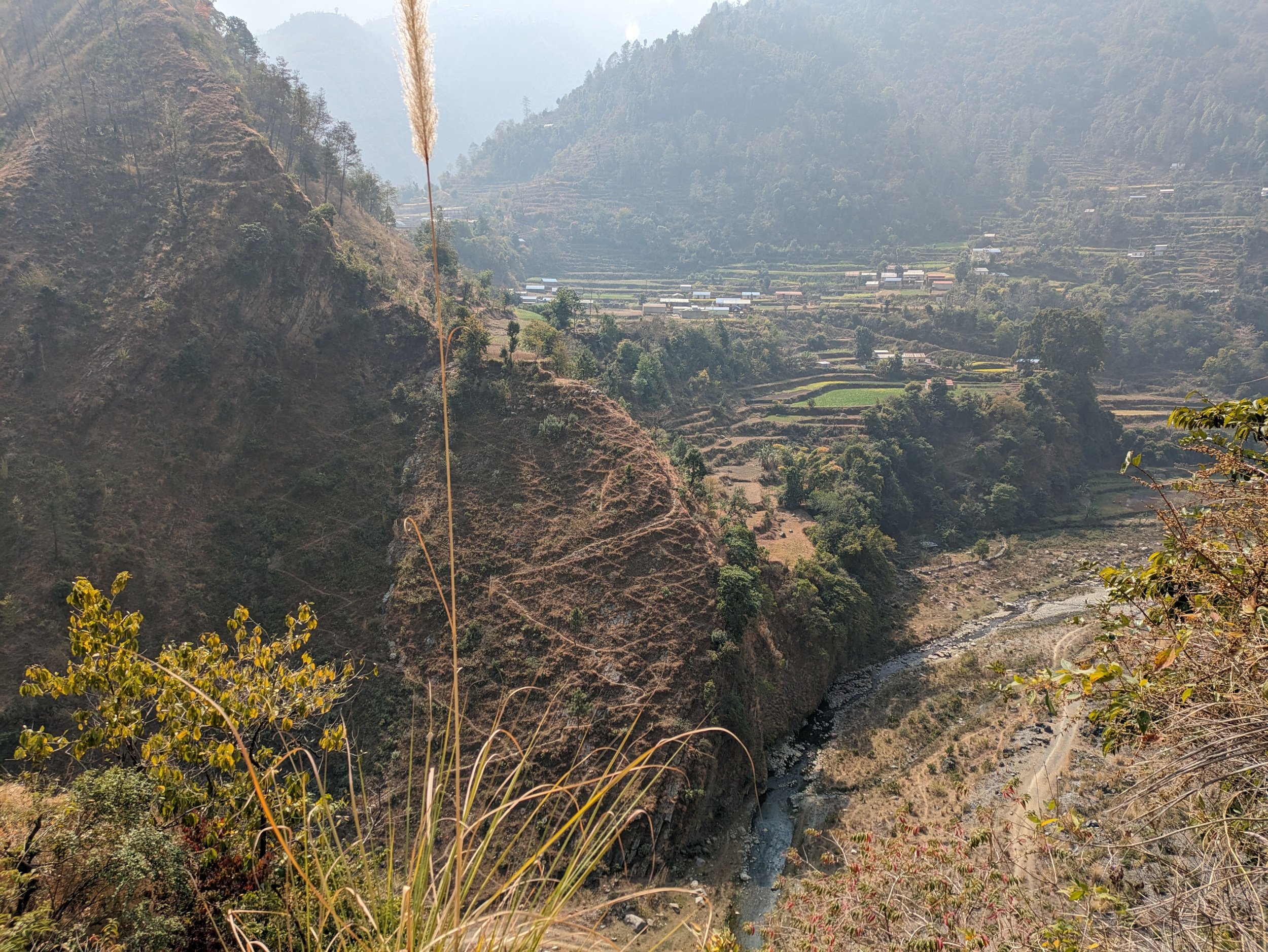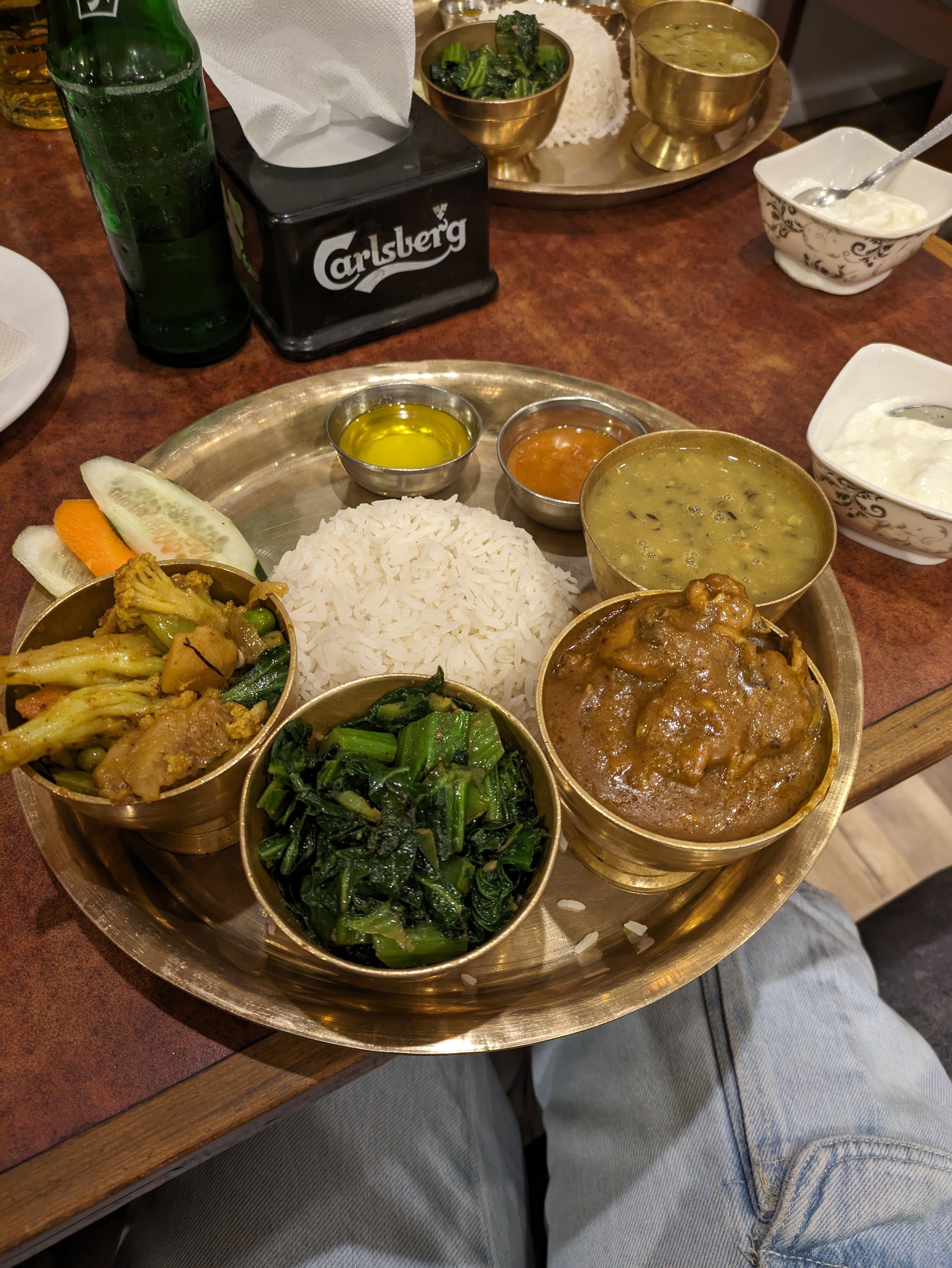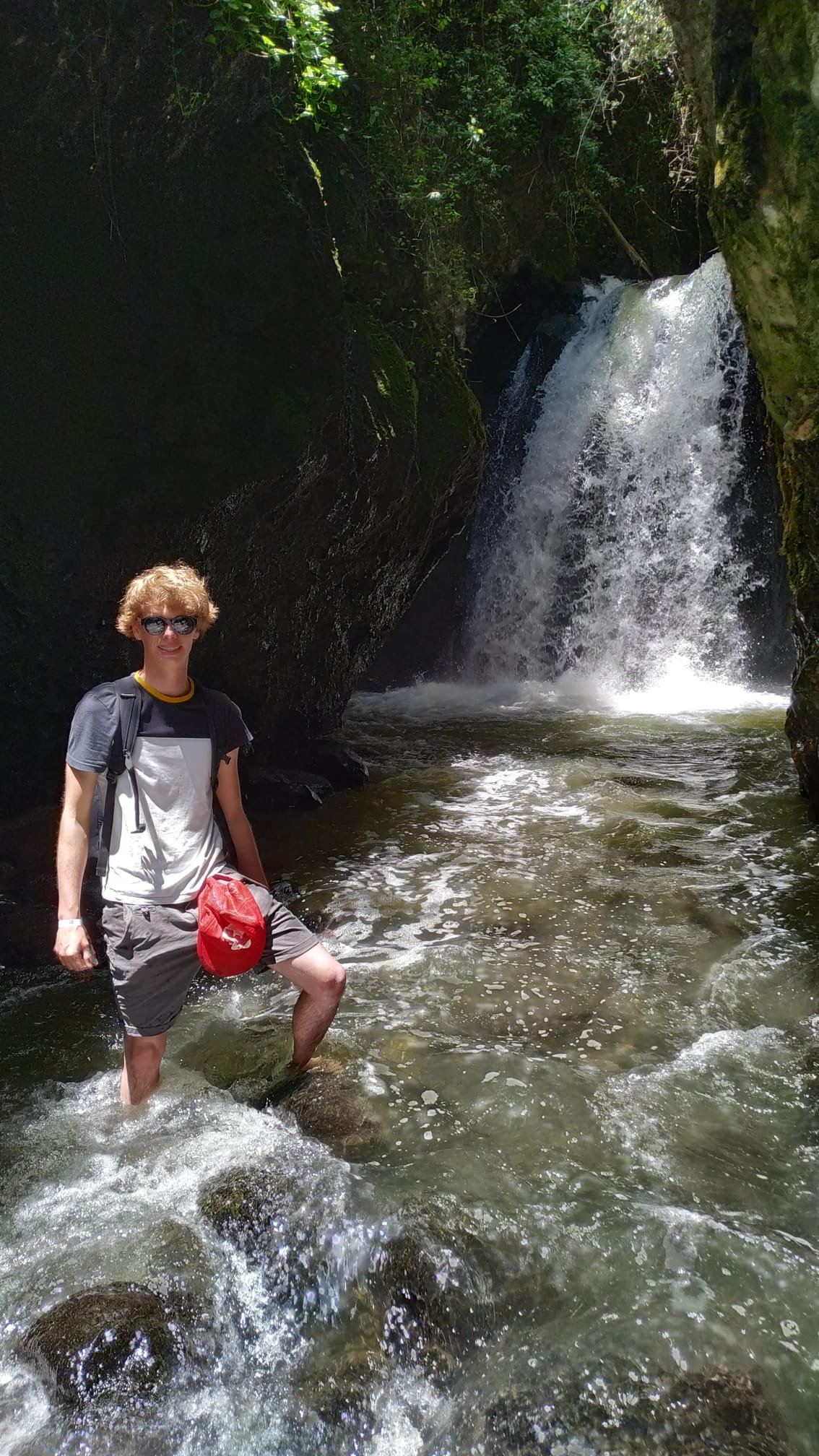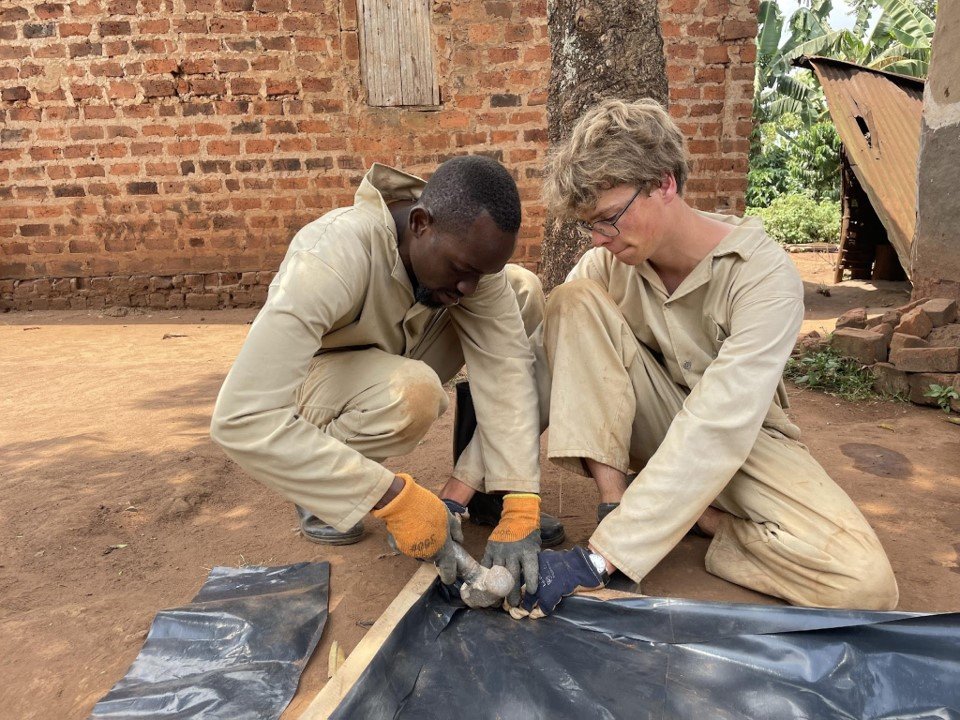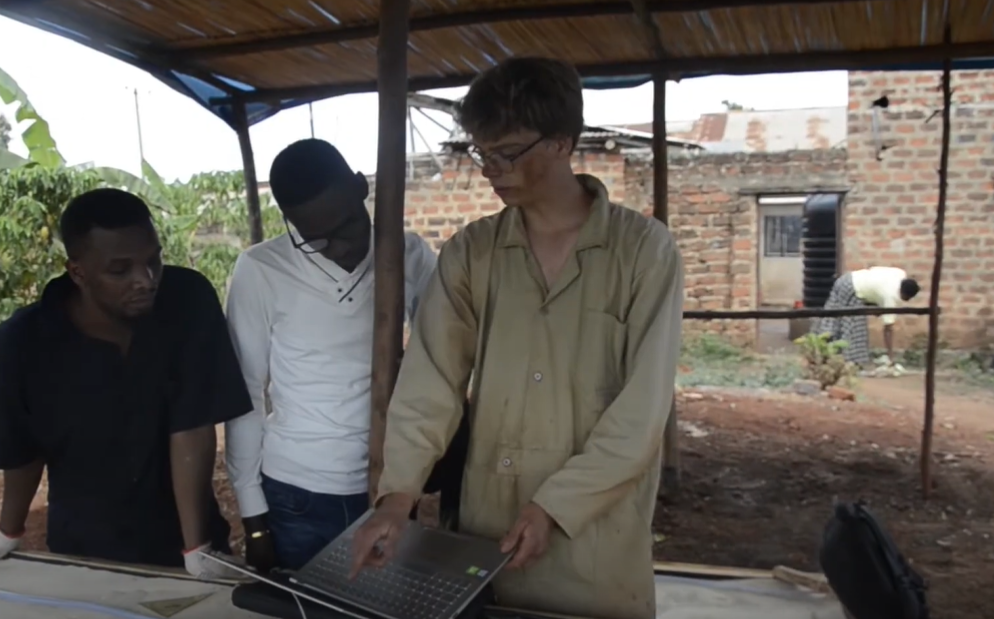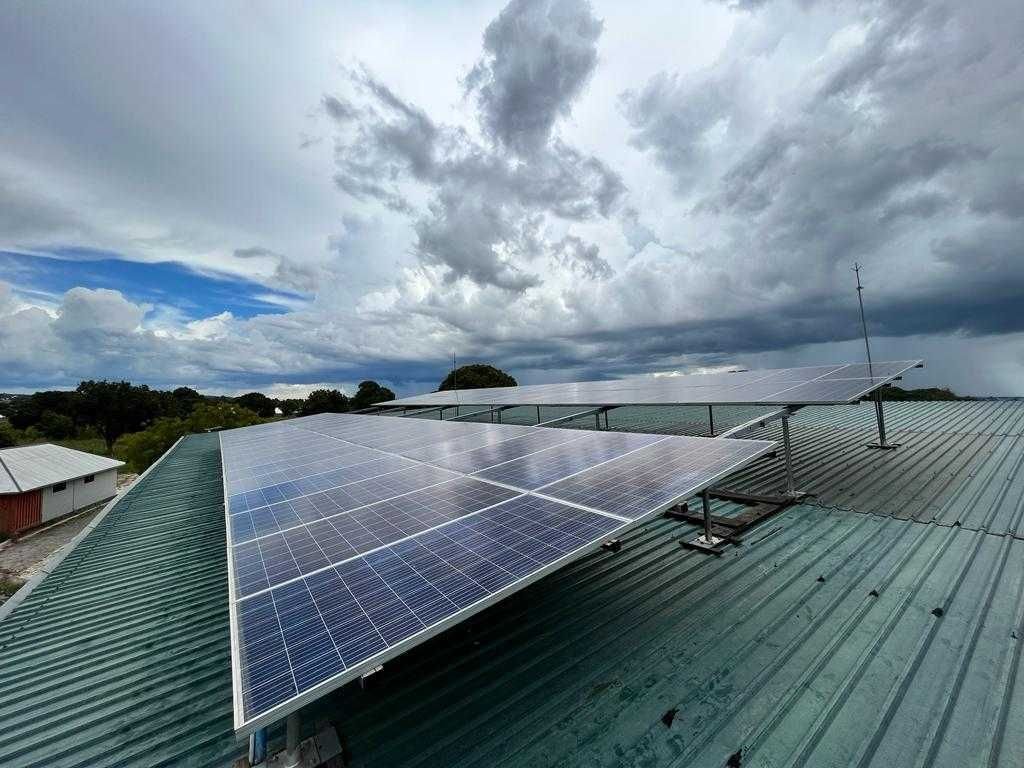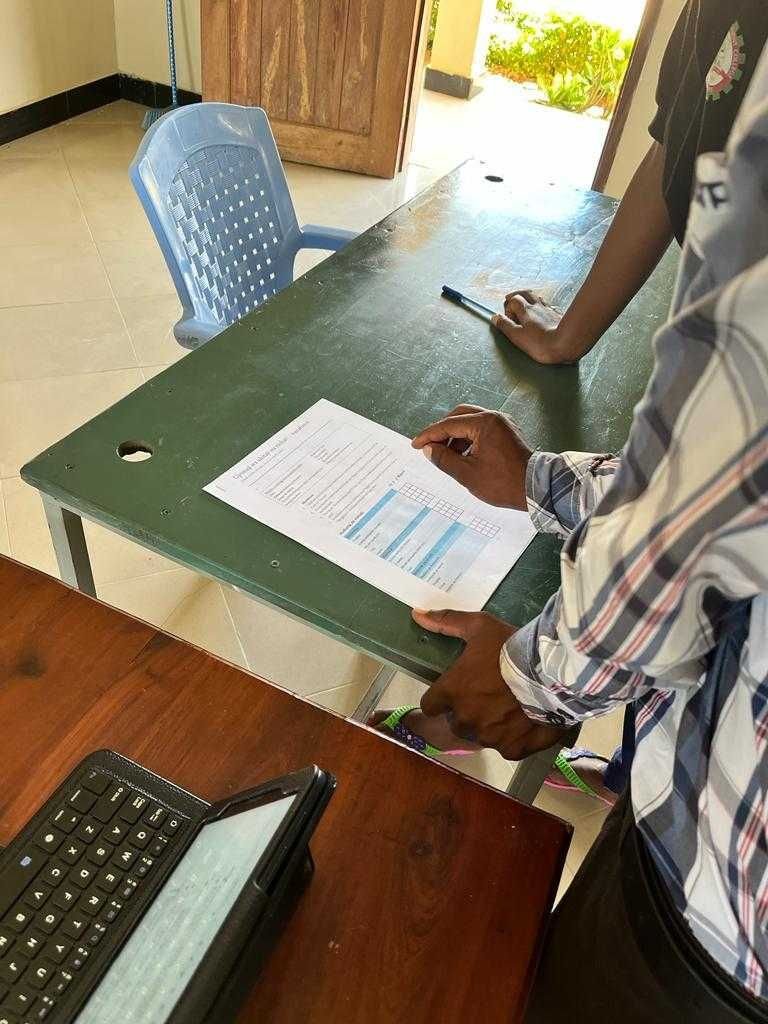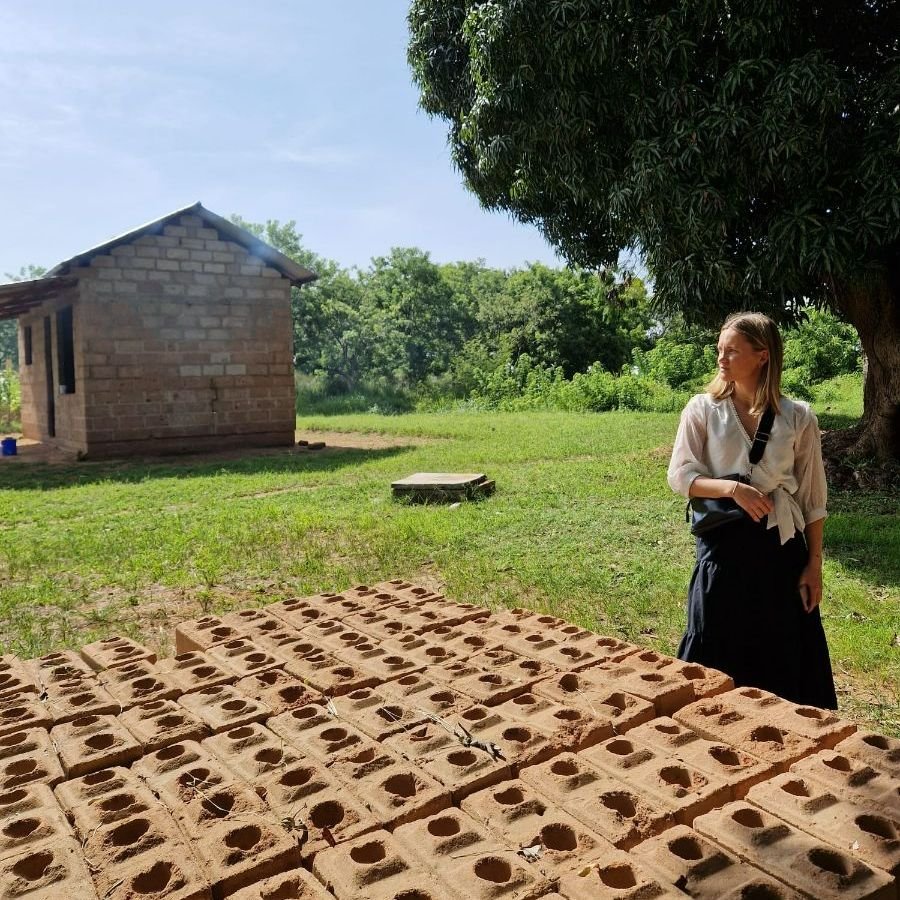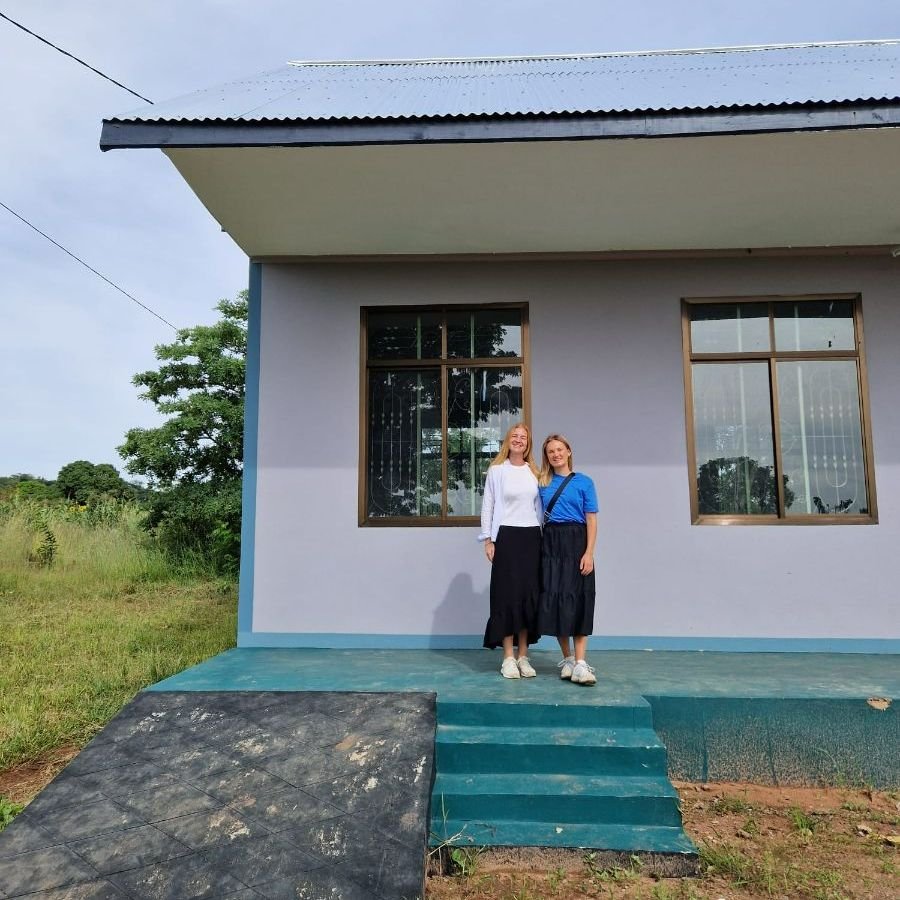Photo above by Lovisa Magnusson Ericsson and Martina Prpic Vucenov from their travel story below
From Concept to Construction – A Brick-Lifting Journey in Nepal
Morris’ and David’s Travel Journal from Nepal
Engineering students Morris and David travelled to Nepal to support Build up Nepal in developing a tool for lifting fragile, water-rich interlocking bricks. The aim was to improve handling methods and reduce strain on workers. Their time in Nepal combined practical design work with field testing and collaboration on site. Read their diary for a summary of the project and their experience.
Hello, We are Morris and David, two engineering students who recently travelled to Nepal to conduct our thesis work at Build up Nepal. From our time away we have learnt a few things, such as moving confidently when crossing the roads (kind of), playing cricket (almost), and eating Dal Bhat for every meal (when we did not eat Momos).
Figure 1: Morris and David Figure 2: Trying to cross the road
Figure 3: Trying to play cricket. Figure 4: Eating Dal Bhat
The problem we were tasked to solve was to create a solution for lifting uncured interlocking bricks produced with Build up Nepal’s machines. The process right now is that workers lift the bricks from the machines with their bare hands, which is difficult since the bricks are fragile and heavy. As the goal is to increase the water content in the bricks even more, which would make the bricks even heavier and more fragile, Build up Nepal wanted to find more efficient and user-friendly methods for handling the uncured bricks. Increasing the water content is beneficial as it can minimize the cement needed, as well as create better performing bricks.
Figure 5: Manual lifting of an uncured brick >>
We began our work with a closer investigation of the problem. We made bricks ourselves, talked with the office-workers at Build up Nepal, researched solutions that solved problems similar to ours, and measured the bricks and machines. Later we generated a wide range of concepts, which we over the course of time narrowed down to a single concept. With the help of the fantastic workshop at Build up Nepal, we managed to create four iterations of a physical prototype of our concept.
Figure 6: Morris and David holding a prototype of the brick lifterFigure 7: An early iteration of the brick lifter
Since the current method relies on lifting bricks manually by hand, we prioritized simplicity in our solution. To minimize barriers to adoption, the design was kept as minimal as possible.
As shown in the images, the brick lifter uses a mechanical clamping mechanism activated by the lifting motion itself. By leveraging the brick’s weight, the tool applies pressure along its long sides to hold it securely in place.
To ensure reliable lifting, we calculated the lever arm length. A lever that’s too long applies excessive pressure and risks breaking the brick, while one that’s too short fails to grip it properly. The handle’s position also needed to align vertically with the center of gravity to maintain balance while lifting.
These calculations, combined with ergonomic principles, observational insights, and findings from our pre-study, formed the foundation of the brick lifter’s design. Prototypes were continuously tested both for usability and performance, enabling rapid iteration.
Figure 8: The third iteration of the brick lifter prototype Figure 9: The brick lifter being used to lift an uncured brick
We are very grateful for the time we got to spend in Nepal. Besides the fact that we were able to work in close proximity to the problem we were trying to solve (which otherwise would have been almost impossible), we also got memories that we will cherish for the rest of our lives. Exploring the different historical and religious sites scattered across the Kathmandu valley together with our Swedish colleague Carolina, hiking in the forests on the weekends together with Ramesh, being invited to a traditional Nepali wedding, going to Chitwan national park and seeing rhinos with the office crew, and ascending 4130m to Annapurna base camp, will all be memories we’ll carry with us for a long time. But maybe it’s the smaller, everyday things that we will remember the most from our trip to Nepal, like having tea together at Build up Nepal’s office, sharing lunch and getting to taste homemade Nepali food, or playing Ludo on breaks.
Figure 10: Hike to the Annapurna base camp Figure 11: Trip to Chitwan national park.
Figure 12: Playing musical chairs with the colleagues at Build up Nepal Figure 13: Morris and Carolina looking at the Boudha Stupa
Our time in Nepal has come an end, but we’ll be eager to follow how the country, and our brick lifter, is doing. Our hope is that our solution can help Build up Nepal in their mission to create affordable and safe housing for all.
Carolina’s Travel Diary from Nepal, part III: ”Polluted City and Verdant Countryside”
This is the third part of Carolina Nilsson’s travel diary from Nepal. She’s spending five months there with Build Up Nepal, looking into ways to reduce the use of cement in their building blocks, among other things. Carolina studied construction engineering at Chalmers and first visited Nepal in 2017 to do her thesis with Build Up Nepal. She quickly grew fond of the country and the organisation’s hands-on, meaningful work. Since then, she’s been working in architecture firms in Stockholm but always hoped to return. Now she’s back—and sharing the journey.
High levels of air pollution are common in Kathmandu, with motor vehicles and brick production being some of the main causes. It also doesn’t help that the city is in a sort of natural bowl, surrounded by hills on all sides which trap the air. During the last month, the problem was exacerbated by forest fires around the valley and the pollution ended up reaching historical levels. I felt tired and oxygen deprived. Sometimes, one could even feel the coarser pollution particles between one’s teeth.
The surrounding hills were completely hidden from sight, and in the afternoons, the sun was a perfect crimson disk in the sky. As it set, the otherwise invisible hills were silhouetted against it, as if a jagged chunk of its glowing embers had been torn away. Then it started raining, with a week or two of quite violent downpours. It never rained the whole day, but when it rained it RAINED, and there were a lot of lightnings too. The air cleared somewhat, it got easier to breathe, and the closest hills reappeared on the horizon.
As for the work, I’ve finished my calculations for the field compression tester and made a table of values. Now the idea is that one should be able to use the small, portable testers out on the sites for simple quality checks of the blocks and get an indication of what pressure they can withstand.
Making shrinkage test samples
My preparations for the shrinkage tests also continue. After doing some research, I realized the shrinkage test mould we’d bought was actually for cement, not concrete. The concrete one is a bit larger, to accommodate for the coarser aggregate. I knew finding the mould had been too easy! There had to be some problem... Still, we decided to use the one we had, while looking for the larger one. Gajmer in the workshop built an appliance to compress material in the mould. Unfortunately, the samples we made cracked every time. It seemed like we really did need the larger mould. I hadn’t been able to find the correct one in the city though, so Gajmer had to build one for me from scratch. After a few trials, we found a design that worked. Now we’re finally ready to start producing the test samples!
I’ve also been testing the length comparator, to see if we can get consistent results. I compared the calibration rod that came with the instrument against two metal rods that the guys in the workshop made for me – one longer than the calibration rod, and one shorter. Unfortunately, the length comparator showed that the new rods were constantly shrinking, little by little. How was it possible? Was something wrong with the instrument? I had a theory that the rods were indeed shrinking, as they weren’t completely smooth at the ends from the start. Possibly they were slowly being polished and worn down a little. After a while the values stabilized (to my great relief!) so maybe I’d been right. I also learnt the importance of being very careful with several small things when measuring.
The slightest change in the degree of inclination of the measuring pin of the length comparator had a significant impact on the results. So it’s better to never adjust anything after having started measuring. At one point, I suddenly started getting very varied results out of the blue. Turns out it is crucial to always measure objects with the same side up and down. The upper and lower socket of the length comparator have slightly different shape and size, so the two sides of a measured object might fit differently in them (as was the case with my rods). Many little things to keep in mind!
Morris, David and David’s girlfriend Sofia returned from their trek to Annapurna base camp and came by the office. They seemed to have had a great time, and it was very interesting and fun to listen to their stories. They showed beautiful photos and a video of a rather impressive suspension bridge. Now they’ve travelled back to Sweden. The office feels a lot emptier without them.
Throughout the city, jacaranda trees are blooming. The streets are ablaze with their intensely violet blossoms. It’s a view that gives me so much joy on my way to and from the office!
There have been two holidays – Nepali New Year and 1st of May. I spent one mostly in bed with stomach ache and the other having a cold. Not the greatest. But at least I’ve made it further than expected without getting sick. The previous time I was in Nepal I was sick most of the time. But back then I didn’t have a kitchen. Maybe being able to cook my own food has helped me acclimatize to the local bacterial and viral flora more gradually.
There has also been the Rato Machindranath Jatra celebration on the streets of Lalitpur, in honour of the rain god. A big tower was built on top of an enormous chariot. For weeks I would pass by and see how it took shape, wonder what it was. Then they started slowly pulling it through the city. I came across it on my way to the office, one morning. It towered high and imposing above the jovial crowd in the narrow street between old houses and temples. It was quite a sight! I can’t complain of having a boring way to work, these few months.
This week, I travelled a couple of days to the eastern Tarai (lowland) region of Nepal in order to look at construction sites and finished buildings, see how the houses were doing a few years after completion and talk to local entrepreneurs. I flew to Biratnagar and met up with the engineer Gehendra, who had already been working for BUN the last time I was in Nepal. It was very nice to meet again. We drove around through lively cities and countryside landscapes, amidst small farms, verdant fields and viny rainforests full of monkeys. The weather was warm and a lot more humid than in Kathmandu, but the air was less dusty and polluted. All the colours were vibrant and oversaturated.
Photos and text BY CAROILINA NILSSON
Yesterday evening my landlords held a party to celebrate the last day of Rato Machindranath Jatra. I was quite surprised when I was invited and given huge amounts of delicious food. Some of my neighbours were there a while as well, and it was a nice occasion to get to know them.
My boyfriend is coming to Nepal next week, and then we’re planning to go hiking a week in the Langtang valley, about 50km north of Kathmandu. I’m looking very much forward to it. I’m trying to do more leg exercises in preparation, as I’ve not been exercising as much as I should during the last year. I’ve also gotten a bit addicted to mountaineering videos of intrepid people climbing the various enormous and awe-inspiring peaks of the Himalayas. But I think a valley trek will more than do for me. I can’t wait to see the scenery!
Carolina’s Travel Diary from Nepal, part II: “Five weeks in Nepal!”
Hi, this is Carolina again, writing from Katmandu, Nepal. I’m staying in Nepal for five months to support Build Up Nepal in their work, examining the possibility of decreasing the amount of cement in their building blocks amongst other things. I’ve previously studied construction engineering at Chalmers university and did my thesis for Build Up Nepal in 2017. Now I’ve been in Nepal for five weeks and have been joined by David and Morris, two Swedish engineering students who through EWB-SWE are doing their thesis work for Build Up Nepal. Welcome to follow my travel diary!
The blocks we made during the first few days have finished curing and are ready for testing. Build Up Nepal has developed a simple instrument for testing the strength of the blocks out on the sites, and the blocks we’ve made are going to be used to compare the results from these instruments with those from hydraulic presses. We’re testing each instrument with scales first though, to get reference values. It takes some time but is essential.
We’ve also been making some blocks with CSEB technique. The previous ones I helped make were CCB (Compressed Concrete Blocks) and were composed of only cement, stone dust and water. CSEB stands for Compressed Stabilized Earth Blocks and – as the name would suggest – they’re made of earth mixed with cement. The earth needs to be composed of a certain percentage of gravel and sand with different diameters, so first we had to measure the amount of each component in the earth we were going to use, then calculate what we’d need to add to make the percentages right. Then we could finally start making the blocks. The rest of the process wasn’t so different from that when making CCB.
In the meantime, David and Morris have developed some solutions for lifting the blocks out of the machines during production. The blocks are quite heavy, and when they’re fresh out of the mould they can still be damaged if pressure isn’t spread out across their surface. The guys handed over the drawings for one of their designs to Gajmer in the workshop, who made it into a real tool within only a few hours! Then they made some blocks and tested it. It worked as planned and made lifting a block quite a bit simpler. Now the guys are refining the design.
On the weekends we explored the Durbar squares of Patan and Bhaktapur. The Durbar Squares are the places where one can find the old royal palaces from before the unification of Nepal, and they’re full of temples and other stunning old buildings. There are three of them in the Kathmandu valley. I visited them in 2017 as well. From my memory there were still quite a bit of rubble back then, quite a few buildings that were still under restoration and reconstruction after the earthquake, but now almost everything seems to have been repaired or rebuilt. It was very nice to see. In Bhaktapur we got guided tours of a wood workshop and a traditional paper factory. I bought some presents and some objects for myself. In the paper factory I bought some prints by Robert Gordon Powell, who was an Australian architect and artist who spent his life traveling in Nepal and other Asian countries, studying and documenting the traditional architecture he came across. An extremely inspiring person.
On Shivaratri holiday, last Wednesday, we went hiking on Phulchowki – the highest hill around Kathmandu valley – with Ramesh from the office who seems to know most paths around the valley by heart. We reached the peak, at 2782m (and about 1200m up from where we started) after hiking for about three hours through the forest, under flowering rhododendron trees. Despite a few other groups of hikers, it felt very quiet and peaceful there. A stark contrast from the liveliness down in the city. It was quite foggy though, so we did not have a great view of the valley, but we could see some snowy peaks in the distance.
There was a magnitude 6.1 earthquake in the neighbouring Sindhupalchok region in the middle of the night between Thursday and Friday. Almost everyone else seems to have been awoken by it, some even running outside. But, despite having suffered from a bit of insomnia lately, I slept right through it. Maybe I was just too tired at that point. There were only 6 people reported injured, non the less it’s a good reminder of how frequent earthquakes are here, and of how important the work of Build Up Nepal continues to be.
To be continued…
A visit to Kolandoto Hospital, a part of Healthy Hospital, Shinyanga, Tanzania, by Vib Sakaria from EWB-SWE
My journey from Bukoba to Mwanza International Airport has had some delays, but once Dr. Wallace picked me up,things became smoother. Arriving at the village late in the evening, sharing a meal,planning, and finally getting some rest made me feel like a much-needed break after a long day of travel. The excitement of traveling to HH, just 12 km away, had been building up, bringing back memories of my earlier trip along the same route in the 1960s.
It’s fascinating how much the landscape has changed since my trips in 1962 and 1968. While the main road to Shinyanga is now tarmac, with new settlements emerging and noticeable growth, I found, when talking to the driver, that taking the smaller murram road made the journey shorter and faster.
The transformation of the area has been striking, especially with the expansion of infrastructure and communities. Seeing something as modern as a Coca-Cola billboard along the road is a clear sign of development and commercialization—something that wasn’t there in the 1960s. It’s interesting how small details like that can make a place feel completely transformed.
The most striking difference seems to be how much greener the area looks today, thanks to large-scale rice, maize, and sunflower farming.
Back in the 1960s, the land might have been more open and dominated by scattered acacia trees and natural vegetation. Now, with widespread agriculture, the wilderness has transformed into productive farmland. This shift suggests not only population growth but also advancements in farming practices and land use.
It’s interesting to note that the hanging log hives I once saw along the roadside are no longer visible. This change could be due to several factors, such as shifts in land use, stricter regulations on traditional beekeeping methods, or even evolving beekeeping practices. With Tabora being a major honey-processing center, it makes sense that beekeeping activities might now be more concentrated in that region rather than scattered along the roadsides. It would be interesting to know whether this shift has led to an increase in honey production or if beekeepers are facing challenges in adapting to new methods.
Tanzania is the second largest honey 🍯 producer in Africa.
The road to HH is inland, about 5 km along a murram road from the main road to Shinyanga. Buses traveling north and south make stops to pick up passengers, making the area a small but active transit point. At the entrance to the hospital, small businesses have emerged, likely catering to the needs of visitors, hospital staff, and patients.
The presence of boda bodas everywhere highlights how motorcycle taxis have become a dominant mode of transport, providing a convenient way for people to move around quickly. Nearby, a college stands with students in uniform visible, though it has no direct connection to HH. This indicates how the area has evolved, no longer just a healthcare hub but also a place where education and commerce are shaping the local landscape.
The Main Entrance
The main entrance to the hospital leads to a parking area, with access controlled by security guards who monitor and regulate who enters. Passing through the entrance, one can see a well-organized space, likely designed to ensure order and security within the hospital premises. The presence of guards suggests a structured environment, reflecting the hospital’s growth and the need for better management of visitors and staff movement.
Dispensary II at the entrance gate and without power backup
At the gate, there is a dispensing unit where prescribed medicine can be purchased without entering the main hospital premises.
This setup helps reduce congestion in the main building, allowing patients to quickly access their medication while keeping the hospital less crowded and more efficient. We identified that this location needs to be connected to the backup power system to ensure uninterrupted operation during power outages.
Administrative rooms Dr Wallace office without power backup
Operation room with solar system for maternity ward
Upon arriving at HH Hospital, the doctor received me in the corridor and guided me to his office. We had an introductory meeting where we discussed key aspects of my visit. I was also introduced to his secretary and technical team. After the meeting, we took a walk around the wards to familiarize me with the environment and ongoing activities.
Supplier Support and Project Completion
Davis & Shirtliff Mwanza Ltd (D&S), a well-established company with a rich history, served as the sole contractor for this project.
The supplier played a key role in the successful implementation of the solar backup system at Kolandoto Hospital. From the outset, they demonstrated a strong commitment to service, ensuring a smooth and efficient process.
Upon receiving our request, they quickly recognized the urgency and took proactive steps to meet our needs. Their customer-focused approach, shaped by extensive sales experience and recent branch management responsibilities, was evident in their responsiveness and dedication
A major highlight was their ability to deliver all required components and support a full week ahead of schedule. This efficiency allowed us to complete installation without delays, ensuring a seamless transition to full operation. Their availability and tailored solutions were instrumental in achieving this outcome.
This collaboration has reinforced the value of strong partnerships in project success. With the system now fully operational, the focus shifts to ongoing monitoring and maintenance, which will be managed by the local team following their training on the system’s app.
The supplier’s proactive engagement and reliability have set a strong foundation for future cooperation.
Review the installation and operation of the Solar hot Water Tanks, installed in 2 days
Solar panels have been installed on the hospital roof to provide a sustainable backup power source for the maternity ward. Additionally, one of the two solar hot water systems has been installed outside the ward on a stand, ensuring a reliable supply of hot water for maternity care, showers, and hygiene.To support the solar infrastructure, a dedicated solar component room has been established to house batteries and other critical equipment. This room is temperature-controlled to maintain optimal battery performance and longevity, ensuring a stable and efficient energy supply.
However, it is unfortunate to note that the financial support previously provided by USAID will no longer continue.
This change poses a challenge and requires new thinking.
The EWB-SWE team has implemented proactive monitoring by developing a task list to inspect the solar equipment, which has been translated into Swahili for better accessibility for the local staff. As part of the service monitoring process, a D&S technician conducts a thorough check-up every three months to ensure the system remains in optimal condition.Additionally, the filing of proactive monitoring records will play a crucial role in maintaining system performance, identifying potential issues early, and ensuring long-term sustainability.
Private General Ward and inspecting the hot water temperature from the Solar Hot Water System
Due to an ongoing surgery in the Maternity Ward, we were unable to assess the showering facilities and equipment powered by the backup system.
However, during our visit to the Private General Ward, we observed a doctor and nurse round in progress. This allowed us to see the ward, inspect the shower facilities, and test the system in action. I personally tested the water, and it was hot, confirming that the second solar hot water system, installed outside the building, is functioning effectively.
Laboratory without power backup system
The laboratory and computer facilities are equipped with air conditioning (AC). However, we identified that this location needs to be connected to the backup power system to ensure uninterrupted operation during power outages.
A Gesture of Appreciation and Gratitude
Dr. Wallace officially launched the celebration, expressing sincere gratitude to all stakeholders for their invaluable contributions. EWB-SWE was recognized for its exceptional project deliverables, with D&S’s technical support and installation playing a crucial role in the success.
A beautifully crafted cake symbolized sustainability and harmony, featuring blue water and sky, with a chocolate plate showcasing a radiant sun to represent the solar panels and their vital role in the project. The celebration was further enriched by a variety of African dishes, adding a vibrant cultural touch to the festivities.
To commemorate this milestone, myself from EWB-SWE, a professional D&S technician, and a senior medical doctor from HH had the honor of cutting the ceremonial cake. The hospital staff joined in, filling the occasion with enthusiasm and joy.
Stay tuned for the follow-up of Vib Sakaria’s travel diary and report from HH Healthy Hospital in Kolandoto, Tanzania. Welcome back!
Back in Nepal!
CArolina Nilsson, volunteer
Hello! My name is Carolina, and I’m going to be in Nepal for five months to support Build Up Nepal in their work, examining the possibility of decreasing the amount of cement in their building blocks amongst other things. I’ve previously studied construction engineering at Chalmers university and did my thesis for Build Up Nepal in 2017, when I spent two months in Nepal along with three other students. I loved the country immediately, and gained a lot of respect for the work of Build Up Nepal, which I felt made a real difference. Afterwards I’ve mainly worked at architecture firms in Stockholm, mostly with industrial facilities and offices, but I always hoped to return to Nepal eventually. Welcome to follow my travel diary!
Back in Nepal, part I
So, after almost 8 years, I’m back in Nepal. I was tired after sleeping badly on the plane and having packed until rather late the night before, trying to make sure I had everything I’d need and want to have with me during the coming five months. There were many small but difficult choices to make about what to bring and what to leave behind. Another warm sweater or two more books I really want to read? As I sat in the taxi, traveling through the city, I was once again struck by how alive Nepal feels. There was an energy about it that felt contagious despite my tiredness. Lots of people, lots of buildings in many different colors and shapes, lots of shops, cafés and restaurants everywhere. It was strange seeing the old places again. The taxi rounded a corner and there was Patan Dhoka, the archway to the old city of Patan! It was real, a place one could actually return to.
The office of Build Up Nepal has moved since the last time I was here. In the mornings, I make my way through the old town, along narrow winding alleys between tall buildings and small shrines, keeping to the side for the many scooters. Then I enter a more residential area, walk past villas and several schools, until I reach the office in an elegant older house by a larger road. Everyone there has been really nice, welcoming, and helpful. Most are new from my last visit. I spent my first few days reading research reports and learning how to make building blocks with cement and crushed stone – how to mix the different components, put them in the mold and compact them with the machine. Amongst other things we’re going to examine ways of decreasing the cement content of the blocks, to make them cheaper and more environmentally friendly. And also measure their shrinkage over time to see if it could potentially cause cracks if the blocks are used too early. I also try learning some Nepali, as I go along.
After the first week, two other Swedish volunteers – David and Morris – arrived. They are here to do their thesis project, just like I did the last time I was here.
Then, at the end of last week, the whole office went on a two-days trip to Chitwan national park and we got to come along, see the rainforest in the lower parts of the country and the animals that live there – deer and peacocks and rhinos and crocodiles. We set out on a safari on a misty morning, and it was very atmospheric to drive through the forest and see the shapes of animals and trees emerge from the dense white mist. Then the mist slowly cleared and gave place to a bright and sunny day.
Now we’re back at the office, planning the weeks ahead.
Photos from Nepal by Carolina Nilsson.
A visit to Tanzania for Mavuno’s 30th anniversary – a photo travel diary part II
Susanne Hurtig, EWB’s Coordinator for International Projects and Partnerships, recently travelled to Tanzania to celebrate the 30th anniversary of MAVUNO Improvement for Community Relief and Services. In this travel diary, she shares her experience visiting Karagwe and meeting the people she has only connected with online for the past two years. MAVUNO, founded in 1993, is dedicated to improving the lives of vulnerable communities through sustainable farming and support programmes. Join Susanne as she reflects on her time on the ground and the inspiring stories from this special occasion. This is part II of her photo travel diary.
PART II
21th of August 2024 - Water
How does Mavuno provide its residents with water was the question of today. As you can see there are several ways; by using a borehole and pumping water to other places, rainwater harvesting from the roofs of buildings and for the unfortunate, not being in easy distance from the collected water - a half-dehydrated deep pool that they share with livestock and wildlife. They know they are risking severe diseases but have no alternative. Water is life!!
The last picture is from Kayanga where we have a pilot installation of water purification with the help of chlorine. It is working - the students will get drinking water for their meals and during the day.
22th of August 2024 - Solar panels, District council in Kyerwa, Kindergarten
Today we are off to the district of Kyerwa. As usual we are all in a small bus. The road is bumpy and dusty but you get to see a lot!
District council in Kyerwa
Fantastic to be presented at a meeting with the District Council in Kyerwa. Members are elected inhabitants of the district. A mix between men and women. I even tried to sing along in the National Anthem of Tanzania. And, of course, signing the guest book.
Solar panel installation
Solar panel installation in a hospital for pregnant women and women in labor. Water is scarce and so is electricity. The National Electricity Grid has frequent interruptions interfering with hospital care. Due to this, and the high costs for electricity, the panels have been installed.
We were two people, Andreas and me, who were allowed to visit the ward where they perform cesarean sections. The doctor, a Tanzanian citizen, was educated in Ukraine but has come back to support his own country. ‘
He explained how they are working in spite of the lack of water and the power outages. When the power is off and they have to rely on the solar panels only some equipment is working. But somehow they succeed. Strangely enough. When I think of the Swedish hospitals and all the care we take for granted!
Vicarage
To finalise our trip we were invited to a pastor and his vicarage. He had a kindergarten with a group of kids we met during the break. Some of us were foresighted and brought soap bubbles, to the joy of the children.
23th of August 2024 Catholic mass outdoors and Inauguration of celebration
Catholic mass
The celebrations were to start! We went to the Modal Girl’s Secondary School where they have this huge outdoor space with a built stage. Everyone was there and expectations were high.
It was a traditional catholic mass but with a Tanzanian angle. The priests were using the table as an iconostas. The mass was concluded with communion. And another picture of us all. The evening ended with dinner and celebrations.
24th of August 2024 Celebrations and Graduation for departing students
To celebrate this specific day Mavuno had sewn up dresses and shirts for all in the project including all us guests. They were made in the most different manners. Here you can see the headmistress, district council minister and project director of Mavuno.
Graduation and awarding scholarships! Different groups were showing their capabilities.
Speeches
Many speeches to commemorate our long commitment and work together with the Mavuno Project were held. These speeches also included gifts directed to remember our cooperation. From Sweden a glass drop symbolizes our long partnership in the Water, Sanitation and Health area.
PART I
A visit to Tanzania for Mavuno’s 30th anniversary – a photo travel diary
Susanne Hurtig, EWB’s Coordinator for International Projects and Partnerships, recently travelled to Tanzania to celebrate the 30th anniversary of MAVUNO Improvement for Community Relief and Services. In this travel diary, she shares her experience visiting Karagwe and finally meeting the incredible people she has only connected with online for the past two years. MAVUNO, founded in 1993, is dedicated to improving the lives of vulnerable communities through sustainable farming and support programmes. Join Susanne as she reflects on her time on the ground and the inspiring stories from this special occasion.
18th of August 2024 - The Mavuno office
Imagine that I'm actually on site in Karagwe meeting all the people I only have been talking to via Google meet or WhatsApp during the last two years as both a Coordinator for EWB International Projects and Partnership coordinator.
To see Charles Bahati, the Director of Mavuno Project in hos office, which I recognise!
I arrived in Bukoba and was warmly welcomed by Charles Mbekenga and Linus van der Zande. We made a detour to the Ugandan border to pick up the participants from the German EWB who arrived from Kampala. Natascha Dubovikova and Jacob Geffers. Here together with Charles.
There is, of course, a different atmosphere and a completely different flora from Sweden. One of the first things that struck me was the amount of bananas everywhere. Bananas are one of the most important staple foods of the region. You see people transporting bananas, selling bananas everywhere and you can't get a breakfast without them. I even got to taste bananas cooked on a charcoal grill by the side of the road. They have to be really hot!
All EWB-people were accommodated in Omurushaka at the Triple P hotel. Really nice standard! Sometimes both the water and electricity were turned off, mostly during the night. But when you get used to it - no worries!
Me at the entrance, views from the room and the fantastic furniture (they were comfortable!).
19th of August 2024 – Agriculture and Mavuno Modal Girl’s Secondary School
Agriculture
It is really interesting to see the work Mavuno is doing together with the farmers. Mavuno trains groups of small scale farmers to improve their agricultural techniques and innovations for the purpose of strengthening sustainable food security and economy. Normally they have small groups of farmers and they show, practically, how the crops can change if they do some adjustments. Also they show how to introduce other types of crops to broadening access to a variety of food. It is important to meet the body's need for different components.
Once the farmers understand how they can gear up their agriculture they see how the access to food will be more stable and secure and that they can even sell certain products to get money for, e.g., investing in their children's education.
Mavuno works through seminars, workshops, on farm practices, study tour, farmers exhibition, exchange farm visits and radio program as a cornerstone of our works. And it works! Where Mavuno project is active the standard of living is higher than surrounding areas. At Rukole there is also a water tap - where those who live in the surroundings can fetch water for a small penny. A vital asset and, of course, a place to wash your clothes
Mavuno Modal Girl’s Secondary School
EWB Sweden and Germany have joined forces to support Mavuno in extending their Modal Girl’s Secondary School to also offer Upper Level of Secondary School education (grade 12-13). The work is ongoing and a three storey building is right now being constructed, coming more than half way through the project. The extension will mean that Mavuno's school becomes one of the handful of Secondary Schools in Karagwe and Kyerwa that can offer its students education that makes them qualified for university admission. On Standard Level (grade 7-11), the school has already proven in national exams to offer its students a first-class learning environment where they reach excellent results. Extending the school with grade 12-13 will make the students both qualified and well prepared for university studies. The girls will become role models in one of the poorest regions of Tanzania.
Schools motto is so true: “Girls education is the key to the households and community prosperity”
Photos: Headmistress Gloria Benson is showing us around. She is the one, together with her staff, that has managed to develop the school since the start 2017 to be one of the top 50 schools in Tanzania! Great work, I am so impressed. She shows us the UV-filter that produces drinking water without E.coli and Coliform bacteria.. We also met summer students doing their work in the dining hall.
Photos: Dormitories, so well kept, and leave your shoes outside! Presenting ourselves to the students. They are so welcoming and friendly!
Photos: Visiting the library and computer hall.. The school also has a few EcoSan toilets beside all the pit latrines. It was a pilot installation and now we are about to construct many more. Gardening in mini format. The students are taking care of these plants which gives them veggies for dinner.
Photos: It was really thrilling to see both the existing school but naturally also the future one. It will be impressive to see! The mandatory signing of guest books and all of us outside the school.
Evenings – dinner and presentations
Every evening we gather in the Mavuno Office for a get-together, presentations and dinner. At this occasion Gloria Benson told us about how the school was developed and how they are working forwards. Also Faxon Buguzi informed us on the Children in Needy project. It is a project to support children without means and or family to be able to get education and a better future.
20th of August 2024 - Visiting farmers
We were divided into two groups for visiting farmers. We did this to understand how farmers live and how they have improved their management of their farms with the help of Mavuno.
Here, dung is used to produce biogas for the kitchen. The facility is located close to the "stables". Biogas production is important because it reduces the use of firewood. Normally the women and girls spend a lot of time gathering firewood. It is both time consuming and dangerous. The open fires give rise to air pollution which causes bronchial diseases etc. Also, deforestation is a great danger when it comes to environmental and climate change.
Photo: Sheep are common and this is showing the old ways of keeping corn. And, of course, we have to take a group picture outside their house. A very nice house thanks to all the improvements they have made.
In the evening Kilamba, Happiness and Clara showed us a diagram on the impact they have made throughout the years. Impressive! –– >
Tomorrow we will visit the District Council in Kyerwa, plus see solar panel and water tank installations. And then there’s the big anniversary celebration! Stay tuned for next chapter of my travel diary!
MAVUNO Improvement for Community Relief and Services is a Non-Governmental organization established by rural community people In 1993. The purpose was to improve livelihood through modern techniques of farming and care for the environment.The organization was registered in Tanzania. Currently MAVUNO staff are committed to the day-to-day operations of the programs. However, volunteers are also available locally and internationally. Volunteers are mostly engaged in the field of providing agricultural and psycho-social support to vulnerable groups and needy children as well as follow-ups. It has been learnt through experience of the past program implementation periods that there is a great need to enhance staff motivation through training, exchange visits, learning from other implementing partners and improving on remunerations and allowances for the staff. This improves the quality of services as well as sustaining the programs.
Sustainable Building Blocks in the Himalayas: Linn's Journey to Nepal
Linn Bogren, an Engineering Physics student at KTH Royal Institute of Technology, recently completed a captivating project in Nepal with Engineers Without Borders (EWB) Sweden. Funded by the KTH Field Studies grant, this project offered Linn the chance to apply her engineering knowledge in a real-world setting with a focus on sustainability. We have followed Linn's journey through her travel diaries and photos, and this is the final wrap-up.
Partnering with Build Up Nepal, a Kathmandu-based organization dedicated to eco-friendly construction practices, Linn tackled a project with environmental benefits. Her focus was on developing eco-friendly bricks with reduced cement content. Cement production is a significant contributor to global CO2 emissions, making this project directly relevant to the UN's Sustainable Development Goal for sustainable cities and communities.
Right from the start, Linn was immersed into the project. "From day one, I was thrown right into the action," she recalls. Thanks to the support of Raine Isaksson from EWB Sweden and Ashish Maharjan, the R&D head at Build Up Nepal, she quickly felt comfortable and began experimenting with different brick formulations alongside Saroj Lama and Manoj Chaudhary. "We spent a lot of time testing various mixtures," Linn explains, "which in this case showed the importance of water and compaction of the blocks".
The project extended beyond the confines of the workshop. A memorable field trip to Jajarkot, in the rural areas of Nepal, provided Linn with valuable firsthand experience. This trip not only deepened her understanding of local construction needs but also allowed her to witness the direct implementation of her research at several sites.
Presenting her results to the engineering team and the CEO was a significant milestone. "The organization took my work seriously," Linn remarked, appreciating the support from both Ashish, Raine and her KTH supervisor, Mårten Olsson. This experience has inspired her to continue working in sustainable engineering and further the project's impact. "We are currently writing another paper on the topic of bulk density, which was a central part of my work," she mentions enthusiastically.
Outside of her project, Linn got to experience Nepal's vibrant culture and stunning landscapes. There were some initial adjustments, but the warmth of the Nepali people quickly made her feel welcome. Her leisure time was filled with hiking, visiting temples, and enjoying local festivals and cuisine. "I definitely want to go back," she expresses.
Sustainability was a key focus throughout Linn's experience and her project showed the potential to significantly reduce CO2 emissions within the construction sector in Nepal. Linn's research suggests that widespread adoption of these practices could lead to annual emission reductions equivalent to approximately 1,000 round-trip flights between Stockholm and Kathmandu.
Looking back, Linn encourages others to consider similar opportunities. Her journey to Nepal not only enriched her academically and professionally but also personally, leaving her with unforgettable experiences and a desire to continue making a difference through sustainable engineering.
Thank you Linn! We wish to extend a warm thank you to Linn for sharing her experiences during her trip, as well as for the beautiful photos from her time in Nepal. / EWB-SWE
Travel Diary from Kenya by Carlo Svensson – Part II
Carlo Svensson has a Master's degree from the Royal Institute of Technology (KTH), from the School of Engineering Sciences (SCI) in Applied Physics. He is also a member of Engineers Without Borders Sweden, and as part of EWB's projects, "Supply Chain for Solar Cooking," Carlo is traveling to Kenya starting March 1, 2024. Carlo is writing a travel diary during his project and the work for Project 2024.001. Enjoy!
March 17th:
Traveled to Mombasa today. The train left at 3pm so Charles and Harriet took me to the Safari at Nairobi National Park in the morning. I had the best time!
This was unreal, please note the bird standing on one of the rhinos backs
The train ride to Mombasa was very pleasant and I saw some wild elephants on the way, sadly I did not have time to take a photo. When arriving in Mombasa, I was shocked by the heat and I think especially the humidity. The room better have a fan…
March 19th:
The room did not have a fan…
I would lie if I said I didn’t struggle with the heat, but otherwise I really like Mombasa. Today I visited Tamani, a school for underprivileged kids ages 5-12. I got to interview the teachers and the cooking personnel, everyone was super kind. The best part of the trip so far has been meeting kids from the schools I visit.
Interrupted math class for a quick photo session
I finished the day off at a floating restaurant where I got a drink called ‘Hakuna Matata’ (non-alcoholic, of course) and read one of the books I brought. Maybe I was hallucinating from overheating but while sitting by the water, watching the sunset and reading my book, it felt like time slowed down a bit. It was the most peaceful I've felt in a long time.
March 22nd:
Today I traveled to Mida, a village 2h north of Mombasa by car. There I got to meet Emily Klitzsch who runs several projects on her farm as well as the Tamani school in Mombasa. She was very kind and showed me the animals they kept, her lemon tree plantation and I got to meet her family. I interviewed her regarding her business with the EWB and she invited me to stay for lunch.
Emily and her family were truly fantastic. I hope to see them again someday.
Cute dogs to the left, Anders in the middle (I named him), and Emily & her husband on the right.
March 23rd:
I visited Haller Park today! Great experience and I think the pictures speak for themselves.
All in all great squad
In the evening I had dinner with a contact I got from Harriet (I met her in Nairobi when visiting Thermofield Industrial). It was very fun and a nice last day in Mombasa. I really liked my stay but I never got used to the heat and humidity.
March 26th:
Today Samuel and Sarah drove me to Masinga, a village about 3h by car from Nairobi. I got to visit 3 schools and see how they had incorporated solar cooking into their curriculum. The schools were, understandably, most interested in EWB donating money, I had to clarify that I was only there to do a feasibility study and could not provide donations.
As always, the most fun was visiting the children, I’ll never get tired of it.
A tree plantation the school has started and some cool kids
March 27th:
One of those days where I had nothing on the calendar so I googled ‘cozy cafes in Nairobi’ and got in a taxi heading for Tin Roof Cafe.
Doing this project has been one of the best experiences I’ve had. The variety of visiting different places, meeting different people but also getting days where you can find a good cafe and just relax and work. I can’t recommend it enough.
Got some work done and enjoyed a milkshake or two
March 28th-29th:
Quick trip to the hospital today. I seemed to have an allergic reaction to something. Nothing dangerous though. Nairobi Hospital was great and I got to see a doctor almost immediately. The doctors and nurses were all great and the insurance from EWB paid for the entire visit.
The next day the symptoms returned so I had to be admitted to the hospital again. There seemed to be something wrong with the bed sheets in my hotel so when I was free to go, I switched hotels a day early.
Again, the hospital and staff were amazing and I felt safe the entire time.
I love the smell of antihistamine in the morning
March 30th:
New hotel, new me. I live in a great area, Karen, and there was a 60% discount for this room. I seem to be the only guest so I have this huge hotel area for myself, things just keep getting better and better. I’ve started tinkering with the format and layout of the report. The real writing will commence the last two weeks probably when I’ve met everyone I’m supposed to and I can do some follow ups. It’s nice to have a bit of a head start though.
Yet, another perfect place for romanticizing my own melancholic solitude. Also there is a super chill bird here just kind of hanging around
April 2nd:
The hotel area is huge and I seem to be the only guest. No meetings this week so I have spent a lot of time reading articles on the solar cooking market. Really enjoying life! It’s a 20 minute walk to a nearby mall and you pass a lot of monkeys on the way.
A new buddy who followed me a bit on my way to the mall
April 7th:
Traveled to Kisumu today via bus! The trip took approximately 9h but honestly, it was a great time and the view was amazing! Since the rainy season has begun there was the occasional lightning storm and flooding on the way to Kisumu but in my opinion it just added to the ambiance. I arrived at about 8pm and was served some fish from Lake Victoria. Very excited for my week in Kisumu.
April 9th:
Today I visited Orongo Missions and got to interview them regarding their operations within solar cooking. Had a fun time but the flooding made it a bit challenging to move around and the car got stuck a few times.
Also of note; Bolt and Uber have shamelessly low fees in Kisumu so you also have to pay the drivers cash to be able to get a ride anywhere.
To be continued…..
Kathmandu, Nepal – Travel Diary by Linn Bogren – Part II
Namaste! This is the second entry in my travel diary where I will describe my two months stay in Nepal where I will conduct my bachelors thesis together with Build Up Nepal (BUN), focusing on developing eco-friendly building blocks. I'll be working alongside Ashish Maharjan, responsible for R&D at BUN, specifically analyzing the impact of cement content, water percentage, and bulk density on the strength of the bricks. Linn Bogren, Engineering Physics student at KTH, and Engineers Without Borders Sweden.
Day 9, Sunday (Week 1 Summary)
Kathmandu, Nepal, 2024
Apart from the first intensive days with the field trip and beginning of the testing the week has mostly consisted of getting to know the workplace and the people here. Before Raine Isaksson left we did some initial testing on a measuring equipment we call the cylinder compactor which can be used to measure the bulk density of block mixes. We had a final meeting where we discussed the results we got so far and the direction of the work forward.
I have made my first bricks, but they were without cement, mostly to get to know how the machines work and as a proof of concept. I have also got to participate when Ashish has done testing on other blocks. I have also gotten to meet the office cat Fred. He is quite social and most of the time he is nice but can sometimes get angry and claw at you.
My colleagues have been very welcoming which has made the first days a lot easier. Ashish and Christian have taken me to lunch and even let me try their home-made food. Ashish has also made sure I have somewhere to go for dinner and shopping food.
Here in Nepal most people work 6 days a week which I also do since I will take a week off later when my mom comes to visit. That means that I only have Saturdays free so this week I took full advantage of my off day and walked around Kathmandu. I started the day early at the Buddhist “monkey temple” Swayambunath, where I walked about 100 meters up and walked clockwise around the temple as you should. You could see the city even though it was a bit foggy.
Then I walked down to the Kathmandu Durbar Square where the King used to live. It is one of the World Heritage places and was hugely destroyed during the earthquake 2015. Now most of the temples have been rebuilt and where very pretty. I had a guide who told me the stories of the gods and the buildings for two hours.
On the way there Google Maps told me to walk over the river by a bridge. When I took a couple of steps out on the bridge, I realized that it actually only went halfway. Fortunately, there was a dirt passage closely to the side.
After noon I walked around in the party area of Thamel and eventually went to one of the sports climbing walls there. It was really fun, and it was nice doing some exercise since I have found it hard to run in the city because of the traffic. Overall, a great first day off and a first week in Nepal!
Day 16, Sunday (Week 2 Summary)
Kathmandu, Nepal, March 2024
This week has been quite busy at work with making cement bricks. So far, I have made around 80 blocks and started the testing of them. Ashish helped me in the beginning but quite quickly I had to start being fully in charge of the mixes and procedures when he was busy which has been fun and smooth with the help of Saroj Llama and Ma Noj who are helping me in the workshop.
I bought a phrasebook when I was in Thamel so I have been trying to speak a little bit of Nepali, but it is quite hard since they have some sounds that we do not have and do not really pronounce the words like we would, given the spelling. I am doing my best though and now I know the numbers and some simple words used in the workshop!
On Monday night Ashish took me to Bhaktapur after work where I got to meet his wife Usha and see her beautiful clothing store. They then took me around the temples and small streets on a tour perfect for foodies. We tried samosa, panipuri and eventually stopped at a rooftop restaurant where we had some delicious keema noodles and spicy chicken wings. There was a cat there that really wanted to enjoy the food with us, but the staff could move it inside. Tuesday night I found a ladies group who plays football every week so me and Christian’s wife. Amina went there and it was really fun. I will probably go there every week that I am here now.
During my day off, Christian and Amina took me hiking up Champadevi, one of the peaks that surrounds the valley. We started around 10 and where at the top at 2278 meters around noon where we had some tea and cucumber before we headed down again. At the top we were talking about maybe continuing to the next peaks but after going the way down I think it was a good idea that we did not because I was exhausted. On the way down we also passed by a Buddhist monastery which was very calm, and we didn’t really see any people there. It was very pretty with big cloths waving in the wind and generally the garden was well taken care of. Back in the valley we had some well-deserved dal bhat tarkari. Later that night we visited a pub where a Nepali band called Himalayan Highways where playing. It was a mixture of American and Nepali bluegrass, and I really liked it!
Day 24, Monday (Week 3 Summary)
Kathmandu, Nepal, March 2024
This week has been full of testing and some block making and I am really creating habits and routines. Every day between 1 and 2 it is lunch time but mostly teatime. Tea, and especially Masala tea is much bigger in Nepal than coffee and I actually think it is quite tasty. We sit at the upper terrace and enjoy it while we play Ludo (Fia med knuff) on someone’s phone. The weather is usually sunny and around 20 degrees Celsius during the day but most often quite smoggy. When the view is clearer, for example after a rainy day or when it is windier, you can actually see the Himalayas from the terrace. That happened this Wednesday and it was super pretty! They look like clouds but if you look closely, you can see the mountains peaking up.
Apart from making bricks I have gone with Ashish to different labs around town to investigate if they could do the tests we require. There were definitely some good candidates and could be a part in the process of replacing cement with other pozzolanic materials. After one of the lab visits, we went by Boudha to look at another great Buddhist stupa (temple). There we also had some delicious keema (buffalo ground meat) noodles.
On Friday the 8th of March it was the Nepali holiday Shivaratri when they celebrate the god Shivas birthday (at least here, it seems to differ a bit). Shiva is the destroyer, and the festivals are especially big around Shiva temples. One of the most visited temples during Shivaratri is Pashupatinath and people travel there from all over Nepal and even India. Me, Christian and Amina went there quite early, around 10:30 and it quickly filled up with people. There is a river floating through the area where they have funerals and openly burn the bodies, not for the light-hearted to look at. Mostly it seems like a happy festival though and there where many gurus giving blessings.
Later that night my Dad came to visit during the weekend. The first night we went to the Patan Durbar Square and had some dinner at a roof top bar. On Saturday we went to Bhaktapur, Swayambhunath, the Kathmandu durbar square and during the evening we did some pub crawling in Thamel. They often have live bands performing so we saw a rock band at Purple Haze and the singer Rachana at LOD. Our Sunday consisted of hiking up the mountain Chandragiri which is 2500 meters high. We walked about 7.5 kilometres with an elevation of 800 meters. At the top we were quite tired so then the thali set at the hotel on top was perfect and then we took the cable car down.
Text and photos by Linn Bogren, Engineering Physics student at KTH, and Engineers Without Borders Sweden
Travel Diary in Kenya by Carlo Svensson – Part I
Carlo Svensson has a Master's degree from the Royal Institute of Technology (KTH), from the School of Engineering Sciences (SCI) in Applied Physics. He is also a member of Engineers Without Borders Sweden, and as part of EWB's projects, "Supply Chain for Solar Cooking," Carlo is traveling to Kenya starting March 1, 2024. Carlo is writing a travel diary during his project and the work for Project 2024.001. Enjoy!
March 2nd
I landed at Nairobi Airport early in the morning. After getting a local sim-card and fending off some black cab offers, my Bolt driver picked me up and drove me to my hotel. The car ride lasted for about 20 minutes and I got to see many of the poorer parts of Nairobi on the way. The lack of sleep might have enhanced the initial culture shock a bit but I am certain that in a few days I will feel more comfortable and on top of things.
My hopes for productivity today extend only to starting off the diary, answering emails and gathering some neighborhood do’s and don’ts from the hotel staff. I really feel I need to rest and take all the new impressions in. Tomorrow I want to plan the coming week in terms of who I am to meet and also create an interview structure so that my meetings can go as smoothly as possible. I am truly excited about this project!
March 4th
Today I visited Asulma Centre. Samuel Odhiambo (founder of Asulma Centre) picked me up from my hotel and drove me to the site where they operate. On our way there we passed Kibera, the biggest slum in Nairobi. It didn’t seem right to take pictures but, like I assume for most people who see Kibera for the first time, it left a mark.
When arriving at Asulma Centre we were greeted by the pupils that attend school there. I got to take part in the morning prayer and was shown a demonstration of the solar cookers they have on site. I really enjoyed my stay and got to interview one of the teachers about his role at Asulma Centre and his experiences and hopes for solar cooking. For my next meeting with Samuel, he is going to bring me along when he meets a customer.
I taught the kids the peace-sign. My former hippie aunt would be proud
March 5th
I had a meeting with EED Advisory today in Lavington. Very helpful and super smart. I got a lot of resources and contacts that I think will prove very useful. When we were done I took a stroll around Lavington and then took a taxi to the Swedish embassy. I thought I could just waltz in because I'm a citizen but apparently no. However, right next to the embassy there was a cafe that served the best drink I’ve ever had (alcohol free of course).
I was the only customer so I could walk around and take some pictures in between looking through my notes from the meeting. It was a great afternoon and I definitely feel more at home than I did the day of arrival.
March 6th
I had a meeting, turned lunch, turned coffee with Charles Oloo of Thermofield Industrial today. He was super helpful and very keen on continuing a collaboration with EWB. We talked about setting up some meetings with key people from the government and also to attend a demonstration of his huge solar disc that he keeps at a site a couple of miles out of town. I’m starting to feel way more at home and with every meeting I have, the picture grows clearer of the solar cooking market.
After we said goodbye and I returned to my hotel I took a well deserved nap and then organized my notes. All in all, it was a good day.
March 8th
Today I did not have a single meeting today so I googled some recommended cafés in Nairobi and ended up taking a Bolt to Pallet Café located in Lavington. It ended up being a great choice. The cafe served great drinks and good food. I could sit there with my laptop and read research papers all day. Life is good. It was a great move to leave Sweden during winter.
Amazing place for work. I ended up getting a visit from this guy while having my coffee. I think he’s an undercover cop…
March 13th
Samuel and his friend took me out to Kithimani, a small village a 3h drive outside of Nairobi. I got to meet Sarah who is selling solar cookers there. She invited us for coffee and later lunch after we helped her assemble a large solar dish used for demonstrating solar cooking.
She was very kind and after lunch we visited a local school to say hi to the children and investigate whether or not the school would be open to a solar-cooking solution.
The children had never seen a white person before so initially they all ran away and started crying. But after seeing me interacting with their teachers and parents they all wanted to take photos. A kid asked me “Is it true that you are allergic to the sun?”. I guess technically yes
Overall a great day!
March 14th
Visited Charles Oloos demonstration site today and met his partner Harriet. She was the best! The demonstration site was located a couple of hours outside of Nairobi by car and I got to see his 16m² solar dish in action. Super cool stuff!
To be continued.
Kathmandu, Nepal – Travel Diary - Part I
Travel Diary By Linn Bogren, Engineering Physics student at KTH, and Engineers Without Borders Sweden
Namaste! This is the first entry in my travel diary where I will describe my two months stay in Nepal where I will conduct my bachelors thesis together with Build Up Nepal (BUN), focusing on developing eco-friendly building blocks. I'll be working alongside Ashish Maharjan, responsible for R&D at BUN, specifically analyzing the impact of cement content, water percentage, and bulk density on the strength of the bricks.
Kathmandu, Nepal, February 19, 2024.
Today, my second day in Nepal, we went on a field study trip to one of the production sites. Ashish picked me up at my house at 8.00 and then we went to the BUN office to get tools and meet up with Raine Isaksson, who is also visiting BUN through EWB-SWE.
We went in a local taxicab and when we left the city it was clear that it was going to be a ride like I never had experienced before. Forget paved roads, we bounced along mostly sand and gravel, feeling like passengers in a giant washing machine.
The short asphalt sections didn't provide much relief because our driver sped up even on narrow, winding roads with mountains on one side and steep drops on the other. There were many places where the road was being rebuilt and most of the time we were able to go around the trucks and excavators but at one location we had to stop and wait for the road to be reconstructed. Despite being only 30 km away, the travel time was more than two hours.
Around 10:30 AM, we stopped at a local restaurant for a traditional set of dal bhat tarkari, a rice dish with lentil sauce and various vegetables. Of course, we enjoyed it the authentic way using our hands to eat it. A friendly dog at the restaurant was eager to be petted and added a warm touch to the experience.
Nearing our destination, we realized we'd overshot the meeting point with the production site owner. He, in true Nepali spirit, hitched a ride on a motorcycle to catch up.
Finally, at noon, we arrived at the site. Located in a small valley surrounded by high mountains, it was simple yet beautiful. We were shown their brick-making process and conducted some initial tests, measuring the bulk density of their mix, stone content in the dust, density of existing bricks, and their strength using a mini-compression tester. It was helpful to observe their production firsthand, gaining insight into their current performance and understanding their ongoing challenges.
On the return trip, we revisited the restaurant where the friendly dog remained enthusiastic. This time, we had some delicious whole, fried fish. On the ride home I was exhausted from all the new impressions and I think I managed to impress everyone by falling asleep in the bumpy car.
It was an eventful second day in Nepal. Welcome to follow my stay through my travel updates and photos, that will be published on EWB-SWE’s web as we go.
Text and photos by Linn Bogren, Engineering Physics student at KTH, and Engineers Without Borders Sweden
Meet Our Interns: Sakib Muktadir Hossain – “I’ve always seen knowledge as a privilege”
We had the pleasure of chatting with Sakib Muktadir Hossain, a dedicated master's student at Lund University and also one of our talented student interns who has been with EWB-SWE the past few months. Sakib, originally from Bangladesh, shares his experiences, motivations, and insights into his life as a student and intern in Sweden.
Sakib Muktadir Hossain, back home known by his nickname Arnob, is currently pursuing his master's degree in Development Studies at Lund University. The choice to intern at EWB-SWE was not a chance occurrence for Sakib. "I was introduced to EWB-SWE through FUF (Föreningen för Utvecklingsfrågor) but when I got to know more about the organization, it felt like the right place to work at because of the vision it has. EWB-SWE believes in the same principles as I do, so it was a perfect match," Sakib explains.
Sees knowledge as a privilege
Sakib's focus in his work and studies is driven by a sense of responsibility and the belief in the power of knowledge. "I’ve always seen knowledge as a privilege," he shares. This belief is not just theoretical for him; it forms the core of his motivation and actions. "There's someone at another part of the world, whose life might be a little easier because of my work," he remarks.
Enjoys living in Lund
Living in Lund has been an enriching experience for Sakib, marked by an atmosphere of acceptance and a plethora of student activities, including volunteering, which he is passionate about. "Life in Lund is different. There's this atmosphere of acceptance no matter where in the world you're from," he states, appreciating the inclusive and dynamic environment of the city and the campus. Overall, he is enjoying his life in Lund.
Family and friends
Despite finding a welcoming community in Lund, Sakib feels the tug of homesickness, especially during significant cultural events. "I miss my family and friends, especially during special occasions like Ramadan and Eid," he says. However, he has found comfort in the friendships he's made in Lund, which have helped create a sense of belonging in his new environment. He adds with a smile, "Also, I miss the hot weather, but I'm glad that I live in one of the warmest places in Sweden."
Sakib's journey from Bangladesh to Lund, his commitment to development studies, and his work at EWB-SWE is truly inspiring. He is a young professional with a strong dedication to making a difference in the world.
Celebrating A Legacy of Compassion and Innovation: A Conversation with Charles Bahati
The Inspirational Journey of MAVUNO Project's Director, Charles Bahati. As Charles Bahati turns the milestone age of 50, he takes the time to reflect on nearly a quarter-century of impactful work with the MAVUNO Project. His initiative has brought meaningful and sustainable change to rural communities, affecting lives through education, healthcare, agriculture, and economic development.
Why MAVUNO Project Became Charles Bahati's Lifelong Commitment
Charles Bahati is deeply committed to narrowing the divide between rural and urban regions. "The disparities were glaringly evident," he recalls. "Rural communities were decades behind in crucial areas like health, education, and economic opportunity."
Bahati's dedication to his initial goals has not wavered over the years. He set out to support farmers in achieving food security, empower women, provide children access to education, and improve overall living conditions in these communities. It was evident that his expertise was much-needed to bring about tangible improvements.
Transformative Milestones: A Retrospective
Charles Bahati takes special pride in the life-changing transformations he's helped facilitate. "The improvements in these villages are milestones that I will forever treasure," Bahati shares. Families now meet their basic needs more readily—like nourishing meals, better housing, and education for their children. These improvements have also reversed the urban migration trend; people are now returning to their villages, finding them to be better places to live than before.
Bahati highlights one particularly significant accomplishment: the shift in educational opportunities for young girls. Under his leadership, the MAVUNO Project has cultivated a culture that prioritizes education over early marriage, a major stride toward gender equality in these communities.
Celebrating 50: A Special Birthday with a Purpose
Birthdays have always been momentous for Bahati, but this year, his celebration takes on a deeper meaning. "I've told my friends, neighbors, and co-workers that this year is different. I'm planning a special dinner and fundraising event," he informs us. The funds raised will go toward establishing a technical center aimed at combating youth unemployment, which Bahati describes as a "shared rural challenge" that impacts community well-being at large.
Building on a Legacy
As Charles Bahati reaches this significant milestone, his decades-long dedication to the MAVUNO Project stands as a powerful example of compassionate and intelligent leadership. Here at EWB-SWE, we're honored to collaborate with such a dedicated partner, and we eagerly look forward to the impactful work that will undoubtedly continue in the years to come.
Happy Birthday Charles!
We at EWB-SWE are gathering forces to support Charles Bahati’s mission The Mavuno Project. We invite you to join us in supporting Mavuno through our fundraising initiative:
Spotlight on Emerging Talent: Meet Upasana Regmi, a Student Intern Committed to Sustainable Development
As the fall semester unfolds, we are delighted to have a talk with Upasana Regmi, a dedicated student intern who brings with her a unique blend of academic knowledge and practical experience. Hailing from Nepal and currently pursuing her Master's degree in Development Studies at Lund University, Upasana is keen to put her learning into action through an internship with Engineers Without Borders Sweden.
From Nepal to Sweden: An Academic Path with a Purpose
Upasana's academic journey is deeply intertwined with her commitment to development work. "I'm passionate about creating a positive impact, and I see this internship as a vital way to apply my academic insights into real-world solutions," she states. Upasana's choice to study at Lund University was strategic, motivated by the school's multidisciplinary approach that has expanded her understanding of development planning processes.
A Rich Career in Development Back in Nepal
Prior to her current academic pursuit, Upasana had already spent nearly a decade immersed in development initiatives in Nepal. Her work encompassed mental health, disability-inclusive programs, and public health initiatives, particularly in remote communities. This rich tapestry of experiences has sharpened her insights into both the challenges and opportunities in the development sector. "These formative years reaffirmed my desire to acquire more specialized knowledge, to create more effective and sustainable change," she explains.
The Allure of Lund: A Haven for Sustainable Innovation
Upasana's adaptation to life in Lund has been a multi-faceted experience that goes beyond academia. For her, the city is not just an educational hub but a "captivating tapestry of history, academic brilliance, and exceptional quality of life." Lund's commitment to sustainability particularly resonates with her, and the city's vibrant student community provides a sense of belonging and a rich cultural exchange. Upasana finds herself particularly drawn to Lund's green spaces, which offer a balanced blend of urban and natural experiences.
Navigating Homesickness with Community Engagement
Though Upasana deeply values her time in Lund, she acknowledges the emotional toll of living far from home. She misses special moments like the 'Dashain' festival, a significant Hindu celebration of unity and togetherness. "However, serving as the Cultural Secretary for the South Asian Association here has been a great consolation," she shares. The association has not only helped her to celebrate her own culture but also introduce its diversity to the broader student community, making her far-from-home experience a fulfilling one.
A Bright Future Ahead
Upasana Regmi's passionate commitment to sustainable development and her journey from Nepal to Lund University exemplifies the caliber of interns we are privileged to work with at EWB-SWE. We look forward to seeing the incredible contributions she will undoubtedly make in the realm of sustainable and impactful community development.
Willem Vanmoerkerke: “It's incredibly interesting to hear the stories and initiatives from our partner organisations”
Willem Vanmoerkerke, is one of our new coordinators of International Projects at EWB Chalmers local group. Willem is an engineering student specialising in Material Science and is currently completing one of his Master's years at Chalmers Technical University in Gothenburg. "I'm interested in nanotechnology, and that's what I'm focusing on in my Master's programme," he shares.
Having moved to Gothenburg just last month, Willem is relatively new to the city, but he already feels at home. "I love living here; Gothenburg has a lot to offer and many green areas," he says. In his leisure time, Willem is a passionate cellist, proving that his interests are as varied as they are deep.
Before moving to Sweden, Willem was active in Humasol.be, an organisation similar to EWB, in Belgium. "When I came to Sweden, I looked for a similar way to engage and found EWB-SWE," he says. He particularly appreciates the provided webinars and handbooks, describing them as "useful resources."
Willem has hit the ground running and is already involved in three projects: the new laboratory for Mkula Hospital, a new compound for Asulma Center, and a WASH project with Vulnerable Aid Organization (VAO), where he is working closely with newly recruited project teams. "It's been a hectic but rewarding experience," he admits.
One aspect he finds most rewarding is the opportunity to engage with partner organisations. "It's incredibly interesting to hear the stories and initiatives from our partners, like the Vulnerable Aid Organization (VAO)," he adds.
Besides his duties as a coordinator, he has been actively involved in the local Chalmers group's recent recruitment drive. "We have two new coordinators and five new team members, which is fantastic," he says.
Willem believes that his time at EWB-SWE will provide invaluable experiences for the future. "It's particularly enriching for me to compare operations with other organisations I've been involved with," he notes. Looking ahead, he's also keen to explore more of Sweden—specifically, he has his eyes set on a trip to the north, to Kiruna, and would love to go hiking.
From EWB-SWE Newsletter September 2023. Photos from Willem’s earlier work with Humasol.
Travel story from Lovisa Magnusson Ericsson and Martina Prpic Vucenov in Tanzania
Lovisa Magnusson Ericsson and Martina Prpic Vucenov spent a month in Tabora to conduct fieldwork. They were participating in the MFS program as part of their master's thesis in Engineering in Environmental and Energy Systems at the Faculty of Engineering at Lund University. Their goal was to help the Tumaini Open School find a sustainable and reliable energy solution.
We’ve spent a month in Tabora doing fieldwork through MFS for our master's thesis within engineering in environmental and energy systems at The Faculty of Engineering at Lund University. Our goal is to help the Tumaini Open School for pregnant and mothering students to find a sustainable and reliable energy solution. So far, we’ve calculated the school’s total energy demand and identified the prioritized energy services. We’ve also visited similar installations around Tabora to understand the local conditions for PV systems.
Now, we are in the process of optimizing alternative solar energy systems as well as evaluating the costs. We’re also looking into the possibility of having a biogas plant for cooking. We are staying a few more weeks during which we will also visit local biogas plants and we hope to finish all the calculations before we go back home. All Tumaini students we have met have stressed the great importance of having access to electricity at the school. With better lighting they can study more hours, and devices like computers and projectors in classrooms improve the quality of teaching.
The Tanzanian culture is warm and welcoming, and our experience has been amazing. It has opened our eyes to the similarities and differences between our countries regarding energy supply, young people’s education and life in general. We’ve had many interesting discussions and been very well taken care of by our hosts from the school.
We chose to dedicate our thesis to this project because we really wanted to make a difference. By sharing our knowledge, we can truly help these mothers to regain their education and provide for their children. We only see advantages in exchanging ideas and culture between us and those w and we hope our work will contribute be of help to everyone involved.
Kwaheri!
From EWB-SWE Newsletter May 2023
Fieldwork trips to Tanzania, Ghana and Kenya
This spring was a really busy time for us, with several master's students heading to Tanzania, Ghana, and Kenya for fieldwork. In April we had four volunteers in Tanzania, focused on feasibility studies for our new initiative: the Tumaini Open School. Here is a report from two of them.
Two of the Masters students, Elin and Felicia, are concluding their visit in Tanzania and wanted to share their experiences:
"We spent two months in Tabora, Tanzania, working with EWB-SWE on our master's thesis in civil engineering. It's been an enriching experience—Tabora quickly felt like a second home and the team at the Tumaini organization became like family. We've been researching sustainable building solutions for the Tumaini Open School, including alternative roofing options and earth block technology. This opportunity gave us valuable insights into Tanzanian construction methods, as well as the chance to immerate ourselves in a different culture and make some meaningful connections. We were also privileged to meet inspiring and friendly Tanzanian people."
From EWB-SWE Newsletter April 2023

